Organisational Behaviour: Influence on Individual and Team Behaviour
VerifiedAdded on 2023/01/11
|20
|6450
|97
AI Summary
This document explores the influence of organisational culture, politics, and power on individual and team behaviour. It also discusses motivation theories and techniques for achieving goals.
Contribute Materials
Your contribution can guide someone’s learning journey. Share your
documents today.
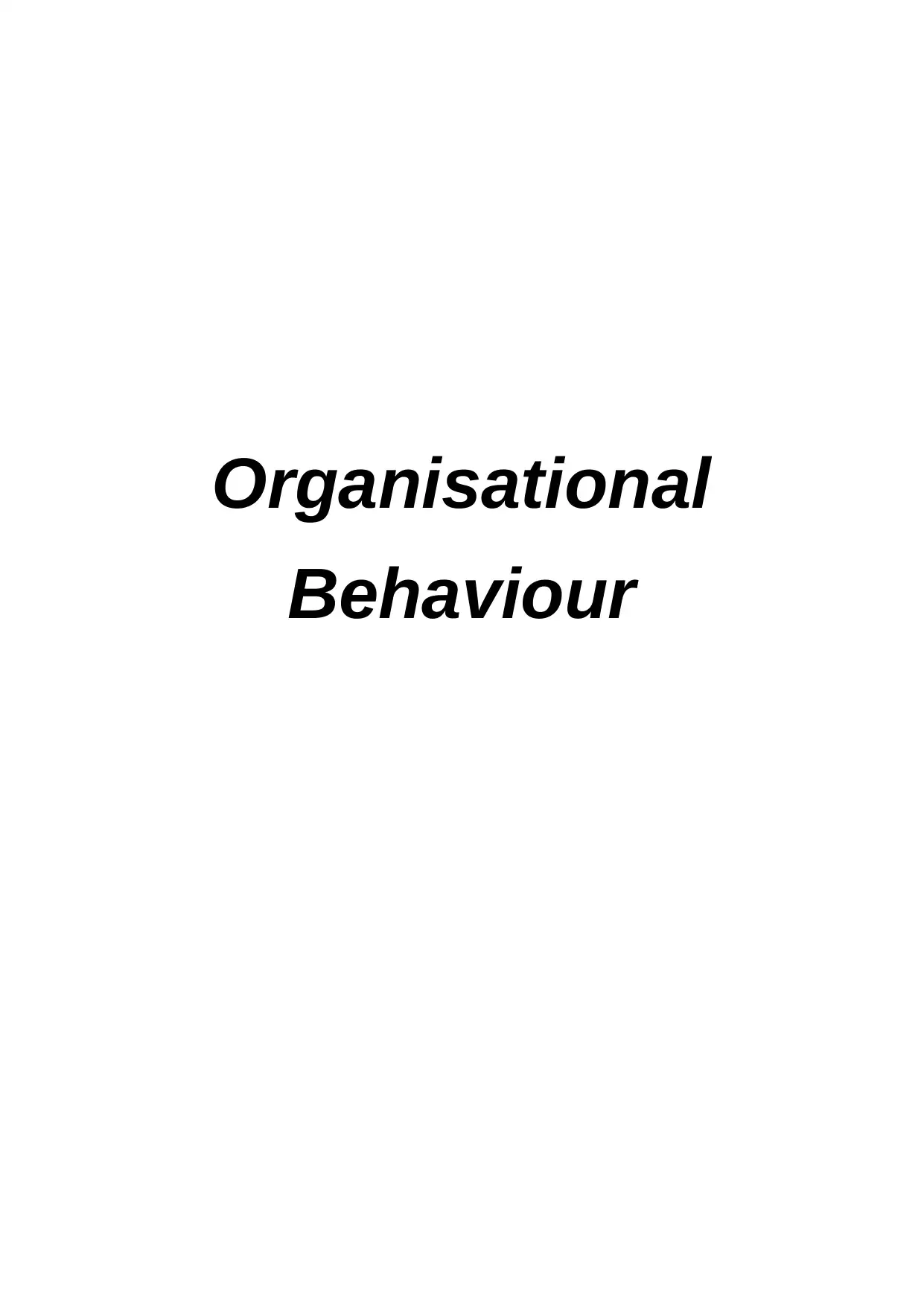
Organisational
Behaviour
Behaviour
Secure Best Marks with AI Grader
Need help grading? Try our AI Grader for instant feedback on your assignments.
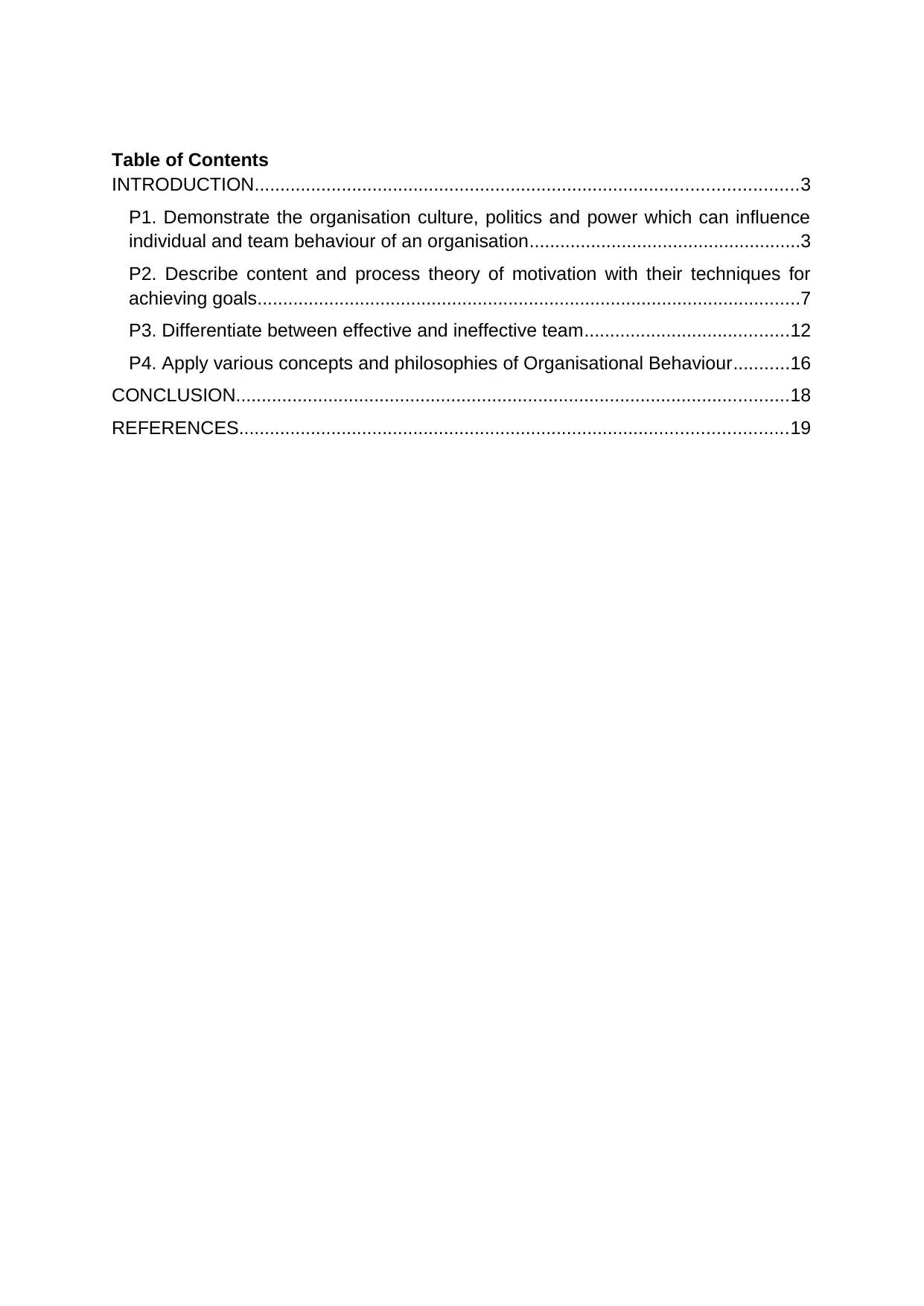
Table of Contents
INTRODUCTION..........................................................................................................3
P1. Demonstrate the organisation culture, politics and power which can influence
individual and team behaviour of an organisation.....................................................3
P2. Describe content and process theory of motivation with their techniques for
achieving goals..........................................................................................................7
P3. Differentiate between effective and ineffective team........................................12
P4. Apply various concepts and philosophies of Organisational Behaviour...........16
CONCLUSION............................................................................................................18
REFERENCES...........................................................................................................19
INTRODUCTION..........................................................................................................3
P1. Demonstrate the organisation culture, politics and power which can influence
individual and team behaviour of an organisation.....................................................3
P2. Describe content and process theory of motivation with their techniques for
achieving goals..........................................................................................................7
P3. Differentiate between effective and ineffective team........................................12
P4. Apply various concepts and philosophies of Organisational Behaviour...........16
CONCLUSION............................................................................................................18
REFERENCES...........................................................................................................19
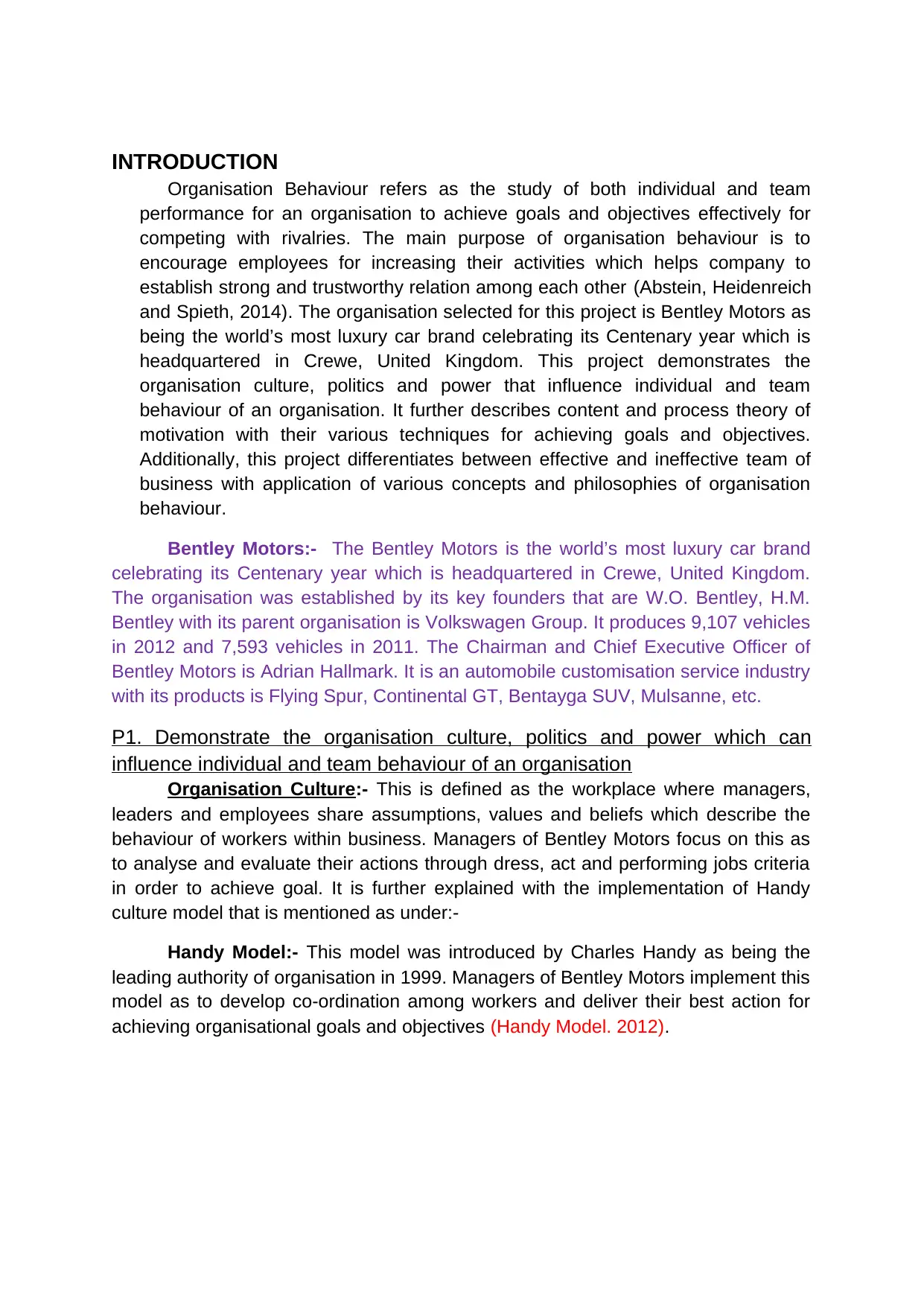
INTRODUCTION
Organisation Behaviour refers as the study of both individual and team
performance for an organisation to achieve goals and objectives effectively for
competing with rivalries. The main purpose of organisation behaviour is to
encourage employees for increasing their activities which helps company to
establish strong and trustworthy relation among each other (Abstein, Heidenreich
and Spieth, 2014). The organisation selected for this project is Bentley Motors as
being the world’s most luxury car brand celebrating its Centenary year which is
headquartered in Crewe, United Kingdom. This project demonstrates the
organisation culture, politics and power that influence individual and team
behaviour of an organisation. It further describes content and process theory of
motivation with their various techniques for achieving goals and objectives.
Additionally, this project differentiates between effective and ineffective team of
business with application of various concepts and philosophies of organisation
behaviour.
Bentley Motors:- The Bentley Motors is the world’s most luxury car brand
celebrating its Centenary year which is headquartered in Crewe, United Kingdom.
The organisation was established by its key founders that are W.O. Bentley, H.M.
Bentley with its parent organisation is Volkswagen Group. It produces 9,107 vehicles
in 2012 and 7,593 vehicles in 2011. The Chairman and Chief Executive Officer of
Bentley Motors is Adrian Hallmark. It is an automobile customisation service industry
with its products is Flying Spur, Continental GT, Bentayga SUV, Mulsanne, etc.
P1. Demonstrate the organisation culture, politics and power which can
influence individual and team behaviour of an organisation
Organisation Culture:- This is defined as the workplace where managers,
leaders and employees share assumptions, values and beliefs which describe the
behaviour of workers within business. Managers of Bentley Motors focus on this as
to analyse and evaluate their actions through dress, act and performing jobs criteria
in order to achieve goal. It is further explained with the implementation of Handy
culture model that is mentioned as under:-
Handy Model:- This model was introduced by Charles Handy as being the
leading authority of organisation in 1999. Managers of Bentley Motors implement this
model as to develop co-ordination among workers and deliver their best action for
achieving organisational goals and objectives (Handy Model. 2012).
Organisation Behaviour refers as the study of both individual and team
performance for an organisation to achieve goals and objectives effectively for
competing with rivalries. The main purpose of organisation behaviour is to
encourage employees for increasing their activities which helps company to
establish strong and trustworthy relation among each other (Abstein, Heidenreich
and Spieth, 2014). The organisation selected for this project is Bentley Motors as
being the world’s most luxury car brand celebrating its Centenary year which is
headquartered in Crewe, United Kingdom. This project demonstrates the
organisation culture, politics and power that influence individual and team
behaviour of an organisation. It further describes content and process theory of
motivation with their various techniques for achieving goals and objectives.
Additionally, this project differentiates between effective and ineffective team of
business with application of various concepts and philosophies of organisation
behaviour.
Bentley Motors:- The Bentley Motors is the world’s most luxury car brand
celebrating its Centenary year which is headquartered in Crewe, United Kingdom.
The organisation was established by its key founders that are W.O. Bentley, H.M.
Bentley with its parent organisation is Volkswagen Group. It produces 9,107 vehicles
in 2012 and 7,593 vehicles in 2011. The Chairman and Chief Executive Officer of
Bentley Motors is Adrian Hallmark. It is an automobile customisation service industry
with its products is Flying Spur, Continental GT, Bentayga SUV, Mulsanne, etc.
P1. Demonstrate the organisation culture, politics and power which can
influence individual and team behaviour of an organisation
Organisation Culture:- This is defined as the workplace where managers,
leaders and employees share assumptions, values and beliefs which describe the
behaviour of workers within business. Managers of Bentley Motors focus on this as
to analyse and evaluate their actions through dress, act and performing jobs criteria
in order to achieve goal. It is further explained with the implementation of Handy
culture model that is mentioned as under:-
Handy Model:- This model was introduced by Charles Handy as being the
leading authority of organisation in 1999. Managers of Bentley Motors implement this
model as to develop co-ordination among workers and deliver their best action for
achieving organisational goals and objectives (Handy Model. 2012).
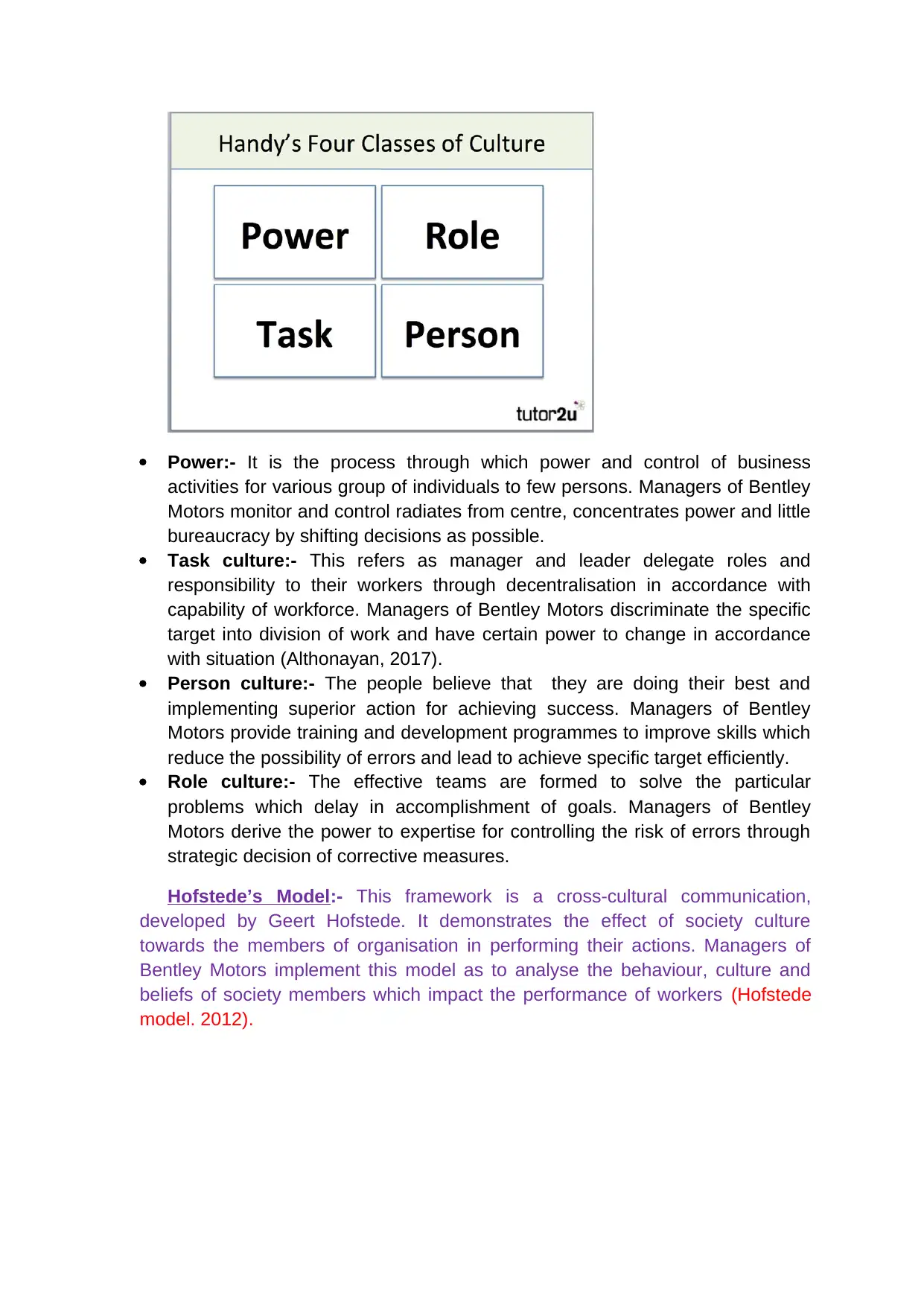
Power:- It is the process through which power and control of business
activities for various group of individuals to few persons. Managers of Bentley
Motors monitor and control radiates from centre, concentrates power and little
bureaucracy by shifting decisions as possible.
Task culture:- This refers as manager and leader delegate roles and
responsibility to their workers through decentralisation in accordance with
capability of workforce. Managers of Bentley Motors discriminate the specific
target into division of work and have certain power to change in accordance
with situation (Althonayan, 2017).
Person culture:- The people believe that they are doing their best and
implementing superior action for achieving success. Managers of Bentley
Motors provide training and development programmes to improve skills which
reduce the possibility of errors and lead to achieve specific target efficiently.
Role culture:- The effective teams are formed to solve the particular
problems which delay in accomplishment of goals. Managers of Bentley
Motors derive the power to expertise for controlling the risk of errors through
strategic decision of corrective measures.
Hofstede’s Model:- This framework is a cross-cultural communication,
developed by Geert Hofstede. It demonstrates the effect of society culture
towards the members of organisation in performing their actions. Managers of
Bentley Motors implement this model as to analyse the behaviour, culture and
beliefs of society members which impact the performance of workers (Hofstede
model. 2012).
activities for various group of individuals to few persons. Managers of Bentley
Motors monitor and control radiates from centre, concentrates power and little
bureaucracy by shifting decisions as possible.
Task culture:- This refers as manager and leader delegate roles and
responsibility to their workers through decentralisation in accordance with
capability of workforce. Managers of Bentley Motors discriminate the specific
target into division of work and have certain power to change in accordance
with situation (Althonayan, 2017).
Person culture:- The people believe that they are doing their best and
implementing superior action for achieving success. Managers of Bentley
Motors provide training and development programmes to improve skills which
reduce the possibility of errors and lead to achieve specific target efficiently.
Role culture:- The effective teams are formed to solve the particular
problems which delay in accomplishment of goals. Managers of Bentley
Motors derive the power to expertise for controlling the risk of errors through
strategic decision of corrective measures.
Hofstede’s Model:- This framework is a cross-cultural communication,
developed by Geert Hofstede. It demonstrates the effect of society culture
towards the members of organisation in performing their actions. Managers of
Bentley Motors implement this model as to analyse the behaviour, culture and
beliefs of society members which impact the performance of workers (Hofstede
model. 2012).
Secure Best Marks with AI Grader
Need help grading? Try our AI Grader for instant feedback on your assignments.
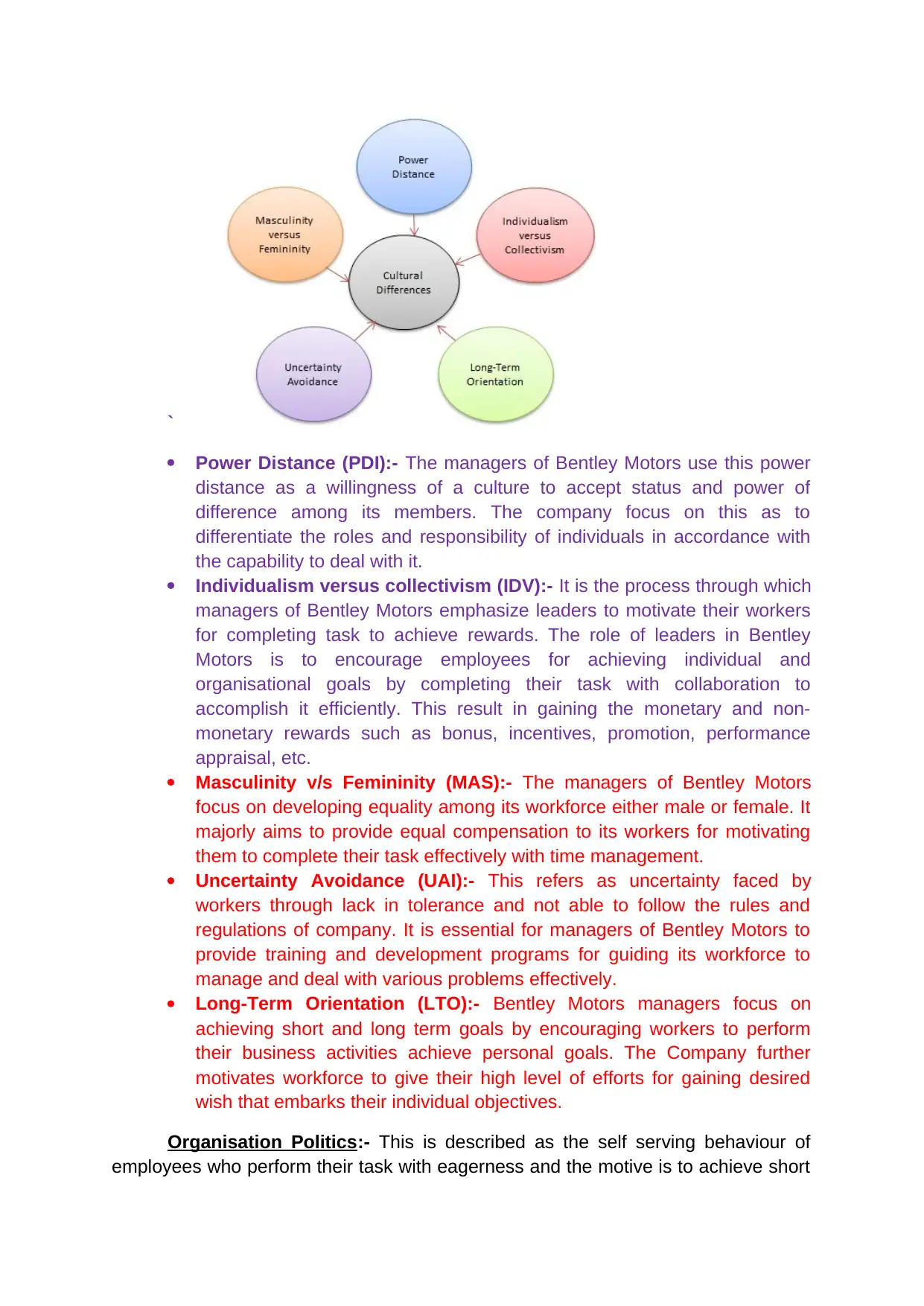
`
Power Distance (PDI):- The managers of Bentley Motors use this power
distance as a willingness of a culture to accept status and power of
difference among its members. The company focus on this as to
differentiate the roles and responsibility of individuals in accordance with
the capability to deal with it.
Individualism versus collectivism (IDV):- It is the process through which
managers of Bentley Motors emphasize leaders to motivate their workers
for completing task to achieve rewards. The role of leaders in Bentley
Motors is to encourage employees for achieving individual and
organisational goals by completing their task with collaboration to
accomplish it efficiently. This result in gaining the monetary and non-
monetary rewards such as bonus, incentives, promotion, performance
appraisal, etc.
Masculinity v/s Femininity (MAS):- The managers of Bentley Motors
focus on developing equality among its workforce either male or female. It
majorly aims to provide equal compensation to its workers for motivating
them to complete their task effectively with time management.
Uncertainty Avoidance (UAI):- This refers as uncertainty faced by
workers through lack in tolerance and not able to follow the rules and
regulations of company. It is essential for managers of Bentley Motors to
provide training and development programs for guiding its workforce to
manage and deal with various problems effectively.
Long-Term Orientation (LTO):- Bentley Motors managers focus on
achieving short and long term goals by encouraging workers to perform
their business activities achieve personal goals. The Company further
motivates workforce to give their high level of efforts for gaining desired
wish that embarks their individual objectives.
Organisation Politics:- This is described as the self serving behaviour of
employees who perform their task with eagerness and the motive is to achieve short
Power Distance (PDI):- The managers of Bentley Motors use this power
distance as a willingness of a culture to accept status and power of
difference among its members. The company focus on this as to
differentiate the roles and responsibility of individuals in accordance with
the capability to deal with it.
Individualism versus collectivism (IDV):- It is the process through which
managers of Bentley Motors emphasize leaders to motivate their workers
for completing task to achieve rewards. The role of leaders in Bentley
Motors is to encourage employees for achieving individual and
organisational goals by completing their task with collaboration to
accomplish it efficiently. This result in gaining the monetary and non-
monetary rewards such as bonus, incentives, promotion, performance
appraisal, etc.
Masculinity v/s Femininity (MAS):- The managers of Bentley Motors
focus on developing equality among its workforce either male or female. It
majorly aims to provide equal compensation to its workers for motivating
them to complete their task effectively with time management.
Uncertainty Avoidance (UAI):- This refers as uncertainty faced by
workers through lack in tolerance and not able to follow the rules and
regulations of company. It is essential for managers of Bentley Motors to
provide training and development programs for guiding its workforce to
manage and deal with various problems effectively.
Long-Term Orientation (LTO):- Bentley Motors managers focus on
achieving short and long term goals by encouraging workers to perform
their business activities achieve personal goals. The Company further
motivates workforce to give their high level of efforts for gaining desired
wish that embarks their individual objectives.
Organisation Politics:- This is described as the self serving behaviour of
employees who perform their task with eagerness and the motive is to achieve short
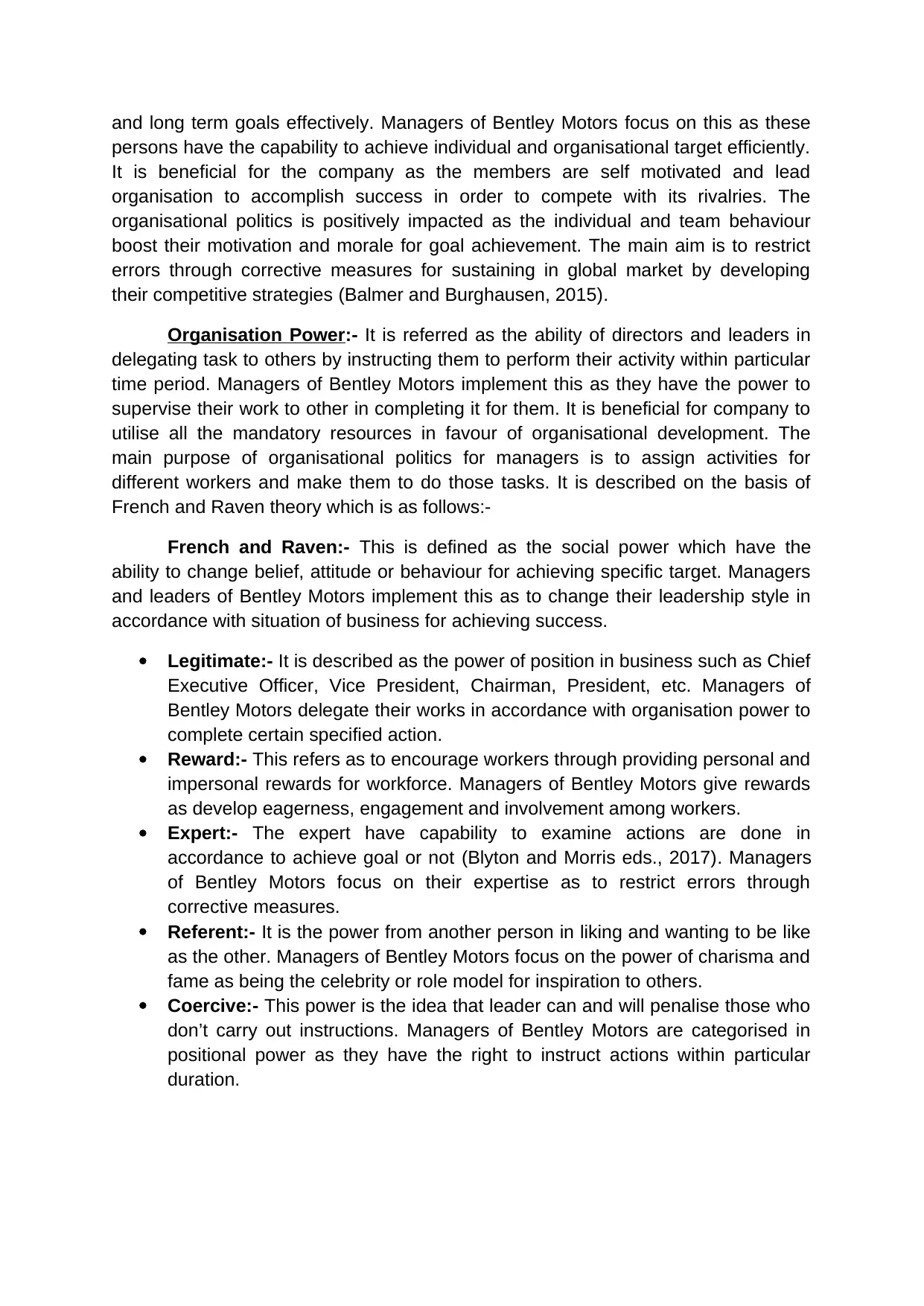
and long term goals effectively. Managers of Bentley Motors focus on this as these
persons have the capability to achieve individual and organisational target efficiently.
It is beneficial for the company as the members are self motivated and lead
organisation to accomplish success in order to compete with its rivalries. The
organisational politics is positively impacted as the individual and team behaviour
boost their motivation and morale for goal achievement. The main aim is to restrict
errors through corrective measures for sustaining in global market by developing
their competitive strategies (Balmer and Burghausen, 2015).
Organisation Power:- It is referred as the ability of directors and leaders in
delegating task to others by instructing them to perform their activity within particular
time period. Managers of Bentley Motors implement this as they have the power to
supervise their work to other in completing it for them. It is beneficial for company to
utilise all the mandatory resources in favour of organisational development. The
main purpose of organisational politics for managers is to assign activities for
different workers and make them to do those tasks. It is described on the basis of
French and Raven theory which is as follows:-
French and Raven:- This is defined as the social power which have the
ability to change belief, attitude or behaviour for achieving specific target. Managers
and leaders of Bentley Motors implement this as to change their leadership style in
accordance with situation of business for achieving success.
Legitimate:- It is described as the power of position in business such as Chief
Executive Officer, Vice President, Chairman, President, etc. Managers of
Bentley Motors delegate their works in accordance with organisation power to
complete certain specified action.
Reward:- This refers as to encourage workers through providing personal and
impersonal rewards for workforce. Managers of Bentley Motors give rewards
as develop eagerness, engagement and involvement among workers.
Expert:- The expert have capability to examine actions are done in
accordance to achieve goal or not (Blyton and Morris eds., 2017). Managers
of Bentley Motors focus on their expertise as to restrict errors through
corrective measures.
Referent:- It is the power from another person in liking and wanting to be like
as the other. Managers of Bentley Motors focus on the power of charisma and
fame as being the celebrity or role model for inspiration to others.
Coercive:- This power is the idea that leader can and will penalise those who
don’t carry out instructions. Managers of Bentley Motors are categorised in
positional power as they have the right to instruct actions within particular
duration.
persons have the capability to achieve individual and organisational target efficiently.
It is beneficial for the company as the members are self motivated and lead
organisation to accomplish success in order to compete with its rivalries. The
organisational politics is positively impacted as the individual and team behaviour
boost their motivation and morale for goal achievement. The main aim is to restrict
errors through corrective measures for sustaining in global market by developing
their competitive strategies (Balmer and Burghausen, 2015).
Organisation Power:- It is referred as the ability of directors and leaders in
delegating task to others by instructing them to perform their activity within particular
time period. Managers of Bentley Motors implement this as they have the power to
supervise their work to other in completing it for them. It is beneficial for company to
utilise all the mandatory resources in favour of organisational development. The
main purpose of organisational politics for managers is to assign activities for
different workers and make them to do those tasks. It is described on the basis of
French and Raven theory which is as follows:-
French and Raven:- This is defined as the social power which have the
ability to change belief, attitude or behaviour for achieving specific target. Managers
and leaders of Bentley Motors implement this as to change their leadership style in
accordance with situation of business for achieving success.
Legitimate:- It is described as the power of position in business such as Chief
Executive Officer, Vice President, Chairman, President, etc. Managers of
Bentley Motors delegate their works in accordance with organisation power to
complete certain specified action.
Reward:- This refers as to encourage workers through providing personal and
impersonal rewards for workforce. Managers of Bentley Motors give rewards
as develop eagerness, engagement and involvement among workers.
Expert:- The expert have capability to examine actions are done in
accordance to achieve goal or not (Blyton and Morris eds., 2017). Managers
of Bentley Motors focus on their expertise as to restrict errors through
corrective measures.
Referent:- It is the power from another person in liking and wanting to be like
as the other. Managers of Bentley Motors focus on the power of charisma and
fame as being the celebrity or role model for inspiration to others.
Coercive:- This power is the idea that leader can and will penalise those who
don’t carry out instructions. Managers of Bentley Motors are categorised in
positional power as they have the right to instruct actions within particular
duration.
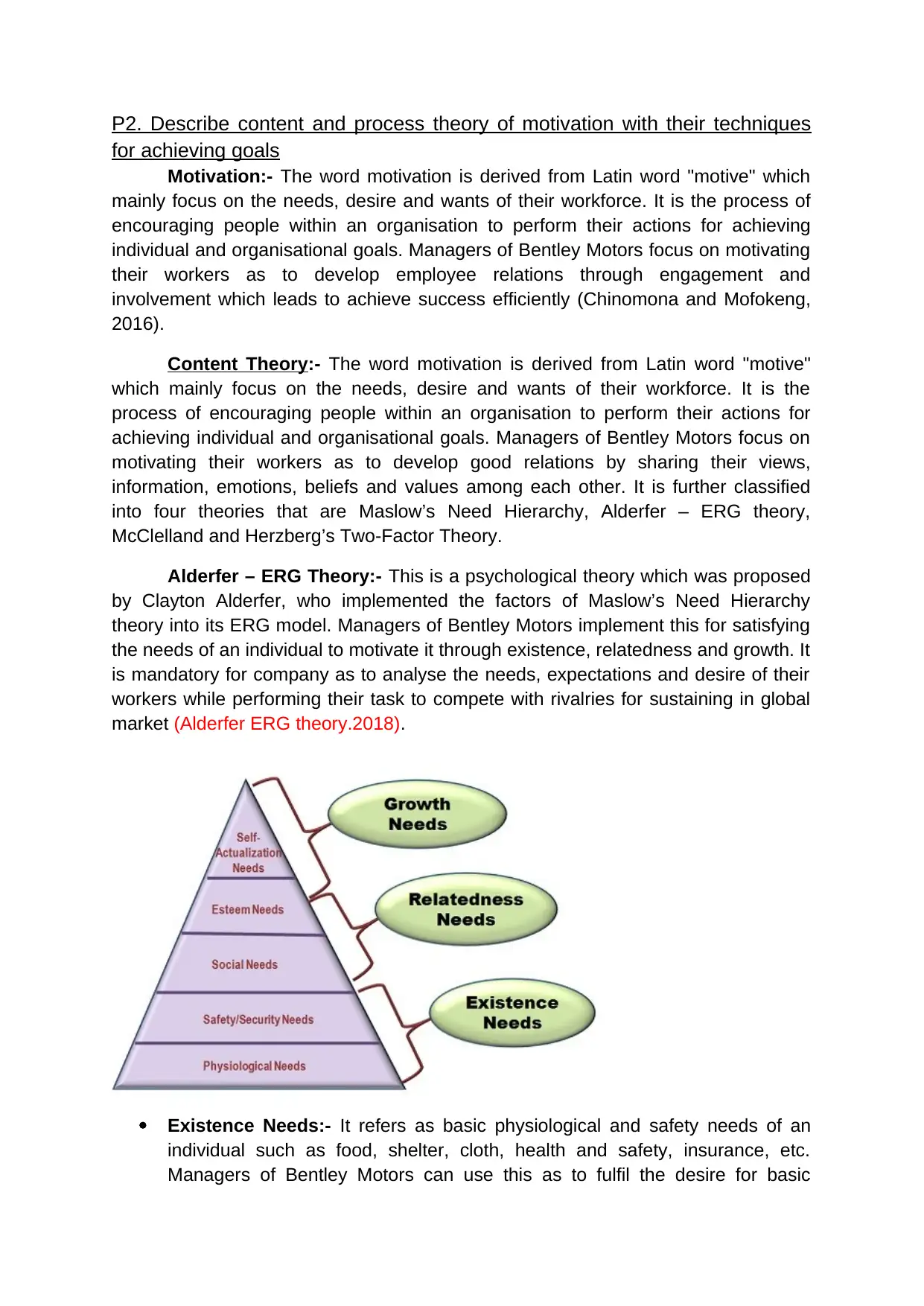
P2. Describe content and process theory of motivation with their techniques
for achieving goals
Motivation:- The word motivation is derived from Latin word "motive" which
mainly focus on the needs, desire and wants of their workforce. It is the process of
encouraging people within an organisation to perform their actions for achieving
individual and organisational goals. Managers of Bentley Motors focus on motivating
their workers as to develop employee relations through engagement and
involvement which leads to achieve success efficiently (Chinomona and Mofokeng,
2016).
Content Theory:- The word motivation is derived from Latin word "motive"
which mainly focus on the needs, desire and wants of their workforce. It is the
process of encouraging people within an organisation to perform their actions for
achieving individual and organisational goals. Managers of Bentley Motors focus on
motivating their workers as to develop good relations by sharing their views,
information, emotions, beliefs and values among each other. It is further classified
into four theories that are Maslow’s Need Hierarchy, Alderfer – ERG theory,
McClelland and Herzberg’s Two-Factor Theory.
Alderfer – ERG Theory:- This is a psychological theory which was proposed
by Clayton Alderfer, who implemented the factors of Maslow’s Need Hierarchy
theory into its ERG model. Managers of Bentley Motors implement this for satisfying
the needs of an individual to motivate it through existence, relatedness and growth. It
is mandatory for company as to analyse the needs, expectations and desire of their
workers while performing their task to compete with rivalries for sustaining in global
market (Alderfer ERG theory.2018).
Existence Needs:- It refers as basic physiological and safety needs of an
individual such as food, shelter, cloth, health and safety, insurance, etc.
Managers of Bentley Motors can use this as to fulfil the desire for basic
for achieving goals
Motivation:- The word motivation is derived from Latin word "motive" which
mainly focus on the needs, desire and wants of their workforce. It is the process of
encouraging people within an organisation to perform their actions for achieving
individual and organisational goals. Managers of Bentley Motors focus on motivating
their workers as to develop employee relations through engagement and
involvement which leads to achieve success efficiently (Chinomona and Mofokeng,
2016).
Content Theory:- The word motivation is derived from Latin word "motive"
which mainly focus on the needs, desire and wants of their workforce. It is the
process of encouraging people within an organisation to perform their actions for
achieving individual and organisational goals. Managers of Bentley Motors focus on
motivating their workers as to develop good relations by sharing their views,
information, emotions, beliefs and values among each other. It is further classified
into four theories that are Maslow’s Need Hierarchy, Alderfer – ERG theory,
McClelland and Herzberg’s Two-Factor Theory.
Alderfer – ERG Theory:- This is a psychological theory which was proposed
by Clayton Alderfer, who implemented the factors of Maslow’s Need Hierarchy
theory into its ERG model. Managers of Bentley Motors implement this for satisfying
the needs of an individual to motivate it through existence, relatedness and growth. It
is mandatory for company as to analyse the needs, expectations and desire of their
workers while performing their task to compete with rivalries for sustaining in global
market (Alderfer ERG theory.2018).
Existence Needs:- It refers as basic physiological and safety needs of an
individual such as food, shelter, cloth, health and safety, insurance, etc.
Managers of Bentley Motors can use this as to fulfil the desire for basic
Paraphrase This Document
Need a fresh take? Get an instant paraphrase of this document with our AI Paraphraser
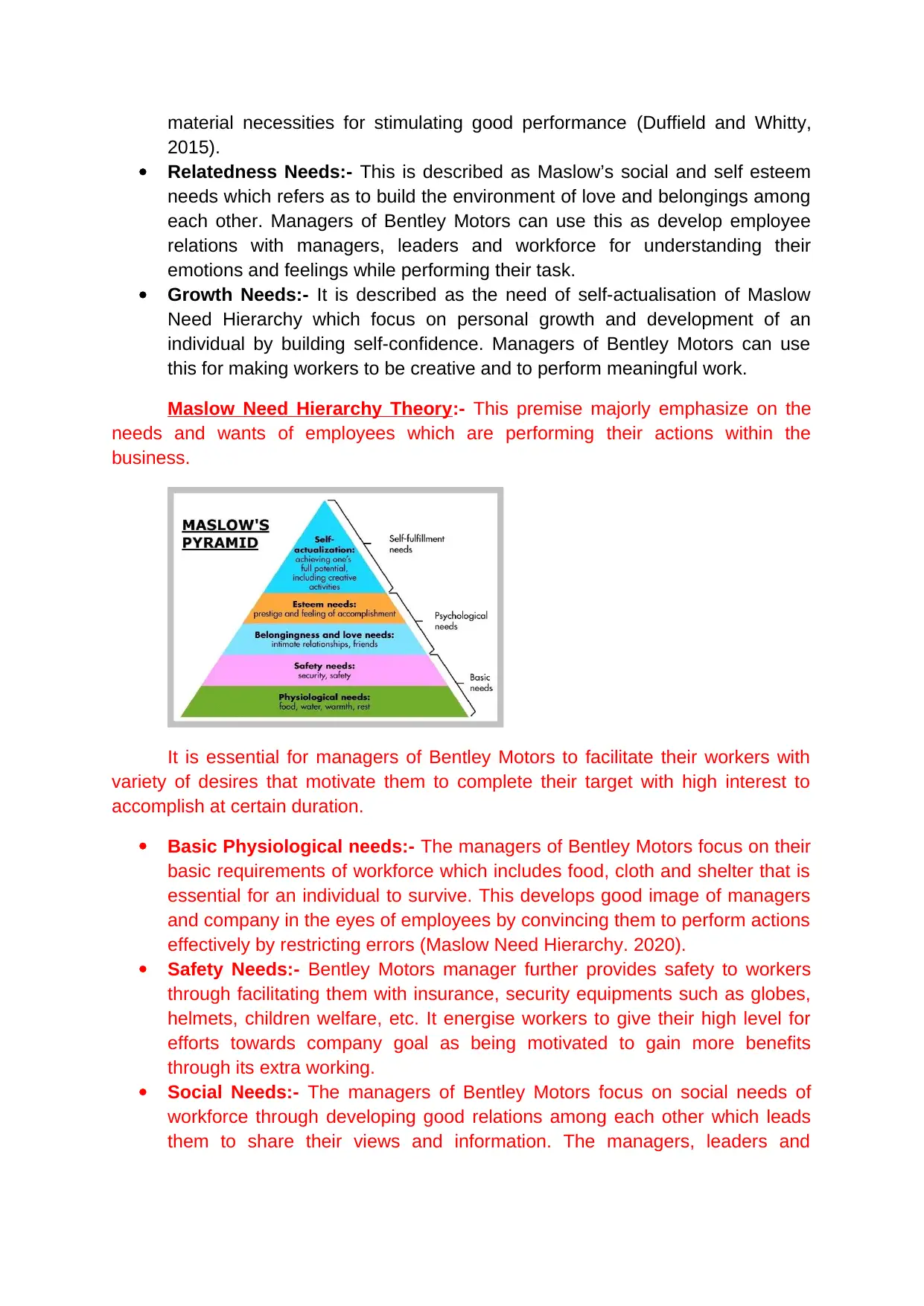
material necessities for stimulating good performance (Duffield and Whitty,
2015).
Relatedness Needs:- This is described as Maslow’s social and self esteem
needs which refers as to build the environment of love and belongings among
each other. Managers of Bentley Motors can use this as develop employee
relations with managers, leaders and workforce for understanding their
emotions and feelings while performing their task.
Growth Needs:- It is described as the need of self-actualisation of Maslow
Need Hierarchy which focus on personal growth and development of an
individual by building self-confidence. Managers of Bentley Motors can use
this for making workers to be creative and to perform meaningful work.
Maslow Need Hierarchy Theory:- This premise majorly emphasize on the
needs and wants of employees which are performing their actions within the
business.
It is essential for managers of Bentley Motors to facilitate their workers with
variety of desires that motivate them to complete their target with high interest to
accomplish at certain duration.
Basic Physiological needs:- The managers of Bentley Motors focus on their
basic requirements of workforce which includes food, cloth and shelter that is
essential for an individual to survive. This develops good image of managers
and company in the eyes of employees by convincing them to perform actions
effectively by restricting errors (Maslow Need Hierarchy. 2020).
Safety Needs:- Bentley Motors manager further provides safety to workers
through facilitating them with insurance, security equipments such as globes,
helmets, children welfare, etc. It energise workers to give their high level for
efforts towards company goal as being motivated to gain more benefits
through its extra working.
Social Needs:- The managers of Bentley Motors focus on social needs of
workforce through developing good relations among each other which leads
them to share their views and information. The managers, leaders and
2015).
Relatedness Needs:- This is described as Maslow’s social and self esteem
needs which refers as to build the environment of love and belongings among
each other. Managers of Bentley Motors can use this as develop employee
relations with managers, leaders and workforce for understanding their
emotions and feelings while performing their task.
Growth Needs:- It is described as the need of self-actualisation of Maslow
Need Hierarchy which focus on personal growth and development of an
individual by building self-confidence. Managers of Bentley Motors can use
this for making workers to be creative and to perform meaningful work.
Maslow Need Hierarchy Theory:- This premise majorly emphasize on the
needs and wants of employees which are performing their actions within the
business.
It is essential for managers of Bentley Motors to facilitate their workers with
variety of desires that motivate them to complete their target with high interest to
accomplish at certain duration.
Basic Physiological needs:- The managers of Bentley Motors focus on their
basic requirements of workforce which includes food, cloth and shelter that is
essential for an individual to survive. This develops good image of managers
and company in the eyes of employees by convincing them to perform actions
effectively by restricting errors (Maslow Need Hierarchy. 2020).
Safety Needs:- Bentley Motors manager further provides safety to workers
through facilitating them with insurance, security equipments such as globes,
helmets, children welfare, etc. It energise workers to give their high level for
efforts towards company goal as being motivated to gain more benefits
through its extra working.
Social Needs:- The managers of Bentley Motors focus on social needs of
workforce through developing good relations among each other which leads
them to share their views and information. The managers, leaders and
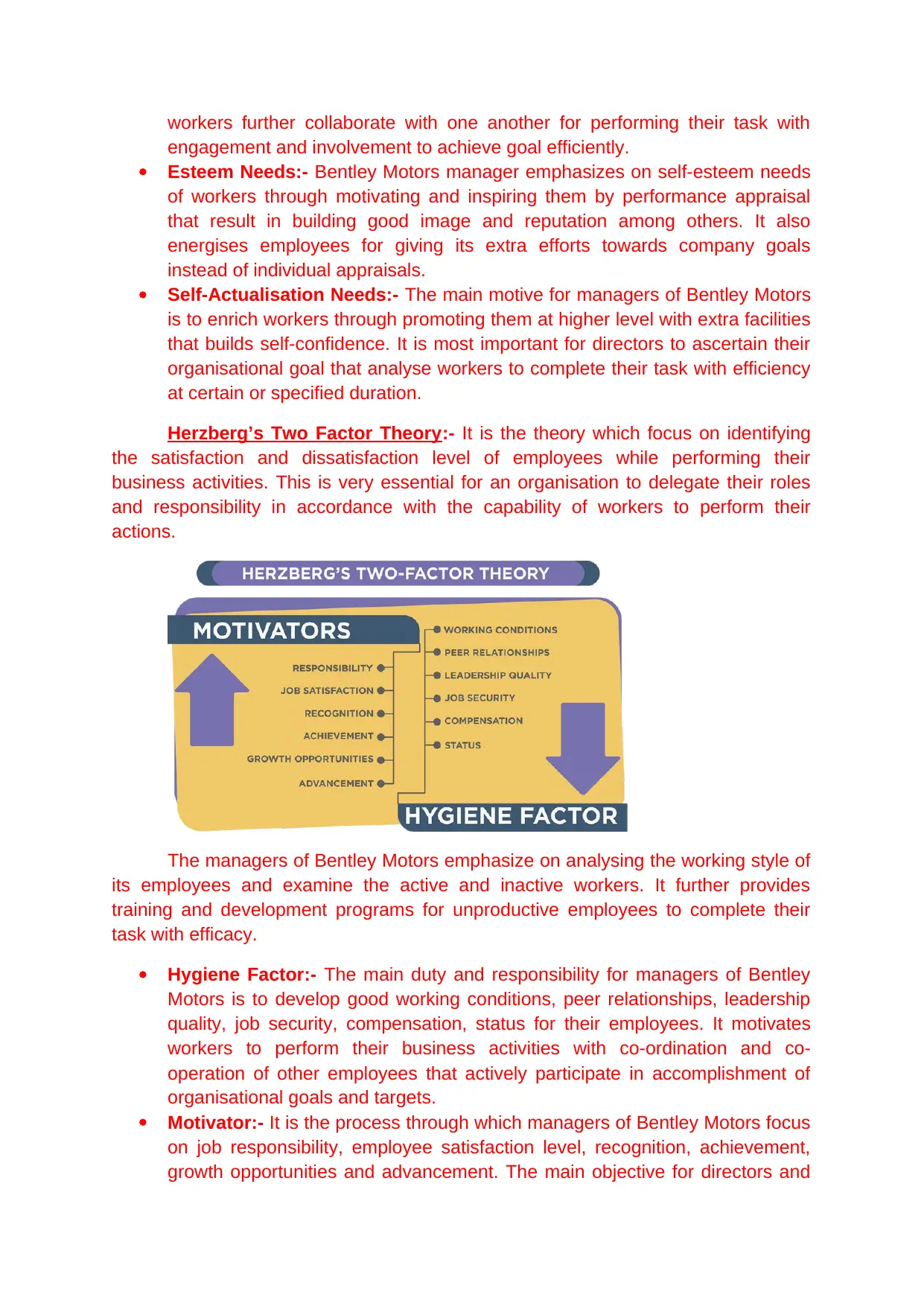
workers further collaborate with one another for performing their task with
engagement and involvement to achieve goal efficiently.
Esteem Needs:- Bentley Motors manager emphasizes on self-esteem needs
of workers through motivating and inspiring them by performance appraisal
that result in building good image and reputation among others. It also
energises employees for giving its extra efforts towards company goals
instead of individual appraisals.
Self-Actualisation Needs:- The main motive for managers of Bentley Motors
is to enrich workers through promoting them at higher level with extra facilities
that builds self-confidence. It is most important for directors to ascertain their
organisational goal that analyse workers to complete their task with efficiency
at certain or specified duration.
Herzberg’s Two Factor Theory:- It is the theory which focus on identifying
the satisfaction and dissatisfaction level of employees while performing their
business activities. This is very essential for an organisation to delegate their roles
and responsibility in accordance with the capability of workers to perform their
actions.
The managers of Bentley Motors emphasize on analysing the working style of
its employees and examine the active and inactive workers. It further provides
training and development programs for unproductive employees to complete their
task with efficacy.
Hygiene Factor:- The main duty and responsibility for managers of Bentley
Motors is to develop good working conditions, peer relationships, leadership
quality, job security, compensation, status for their employees. It motivates
workers to perform their business activities with co-ordination and co-
operation of other employees that actively participate in accomplishment of
organisational goals and targets.
Motivator:- It is the process through which managers of Bentley Motors focus
on job responsibility, employee satisfaction level, recognition, achievement,
growth opportunities and advancement. The main objective for directors and
engagement and involvement to achieve goal efficiently.
Esteem Needs:- Bentley Motors manager emphasizes on self-esteem needs
of workers through motivating and inspiring them by performance appraisal
that result in building good image and reputation among others. It also
energises employees for giving its extra efforts towards company goals
instead of individual appraisals.
Self-Actualisation Needs:- The main motive for managers of Bentley Motors
is to enrich workers through promoting them at higher level with extra facilities
that builds self-confidence. It is most important for directors to ascertain their
organisational goal that analyse workers to complete their task with efficiency
at certain or specified duration.
Herzberg’s Two Factor Theory:- It is the theory which focus on identifying
the satisfaction and dissatisfaction level of employees while performing their
business activities. This is very essential for an organisation to delegate their roles
and responsibility in accordance with the capability of workers to perform their
actions.
The managers of Bentley Motors emphasize on analysing the working style of
its employees and examine the active and inactive workers. It further provides
training and development programs for unproductive employees to complete their
task with efficacy.
Hygiene Factor:- The main duty and responsibility for managers of Bentley
Motors is to develop good working conditions, peer relationships, leadership
quality, job security, compensation, status for their employees. It motivates
workers to perform their business activities with co-ordination and co-
operation of other employees that actively participate in accomplishment of
organisational goals and targets.
Motivator:- It is the process through which managers of Bentley Motors focus
on job responsibility, employee satisfaction level, recognition, achievement,
growth opportunities and advancement. The main objective for directors and

leaders is to analyse the reasons for dissatisfaction level of its workforce that
has to be converted into their pleasure and contentment. The Bentley Motor
managers further take necessary steps for motivating employees through
attaining self goals with organisational success.
Process Theory:- The psychological and behavioural process that motivates
people to act in a particular systematic manner for completing their business activity.
Managers of Bentley Motors implement this as to examine the needs of person
which encourages in achieving target efficiently. It is further categorised into four
theories which are Skinner’s Reinforcement, Vroom Expectancy, Adam’s Equity and
Locke’s Goal Setting Theory (Iyamu and Mphahlele, 2014).
Vroom Expectancy Theory:- This theory assumes that behaviour results
from conscious choices among various alternatives to select one with the motive to
maximise pleasure and minimise pain.
Managers of Bentley Motors focus on this as to analyse the needs and wants
of their workers for providing them job satisfaction which develops their morale.
Expectancy:- The managers of Bentley Motors are beneficial as they use this
strategy with the expectation of increased effort will lead to ascertain effective
performance for achieving goal. It mainly focuses on recruiting right employee
with high skills to perform specific action with specialisation.
Instrumentality:- Managers of Bentley Motors implement this with the belief
that good performance will lead to achieve valued outcome. It further
develops trust in people by making decisions for analysing the discrimination
of outcome.
Valence:- The managers of Bentley Motors are profitable by making good
efforts for achieving success efficiently with the motive to meet the estimated
performance. It creates opportunity for growth and stability of business to
sustain in perfect competition market.
has to be converted into their pleasure and contentment. The Bentley Motor
managers further take necessary steps for motivating employees through
attaining self goals with organisational success.
Process Theory:- The psychological and behavioural process that motivates
people to act in a particular systematic manner for completing their business activity.
Managers of Bentley Motors implement this as to examine the needs of person
which encourages in achieving target efficiently. It is further categorised into four
theories which are Skinner’s Reinforcement, Vroom Expectancy, Adam’s Equity and
Locke’s Goal Setting Theory (Iyamu and Mphahlele, 2014).
Vroom Expectancy Theory:- This theory assumes that behaviour results
from conscious choices among various alternatives to select one with the motive to
maximise pleasure and minimise pain.
Managers of Bentley Motors focus on this as to analyse the needs and wants
of their workers for providing them job satisfaction which develops their morale.
Expectancy:- The managers of Bentley Motors are beneficial as they use this
strategy with the expectation of increased effort will lead to ascertain effective
performance for achieving goal. It mainly focuses on recruiting right employee
with high skills to perform specific action with specialisation.
Instrumentality:- Managers of Bentley Motors implement this with the belief
that good performance will lead to achieve valued outcome. It further
develops trust in people by making decisions for analysing the discrimination
of outcome.
Valence:- The managers of Bentley Motors are profitable by making good
efforts for achieving success efficiently with the motive to meet the estimated
performance. It creates opportunity for growth and stability of business to
sustain in perfect competition market.
Secure Best Marks with AI Grader
Need help grading? Try our AI Grader for instant feedback on your assignments.
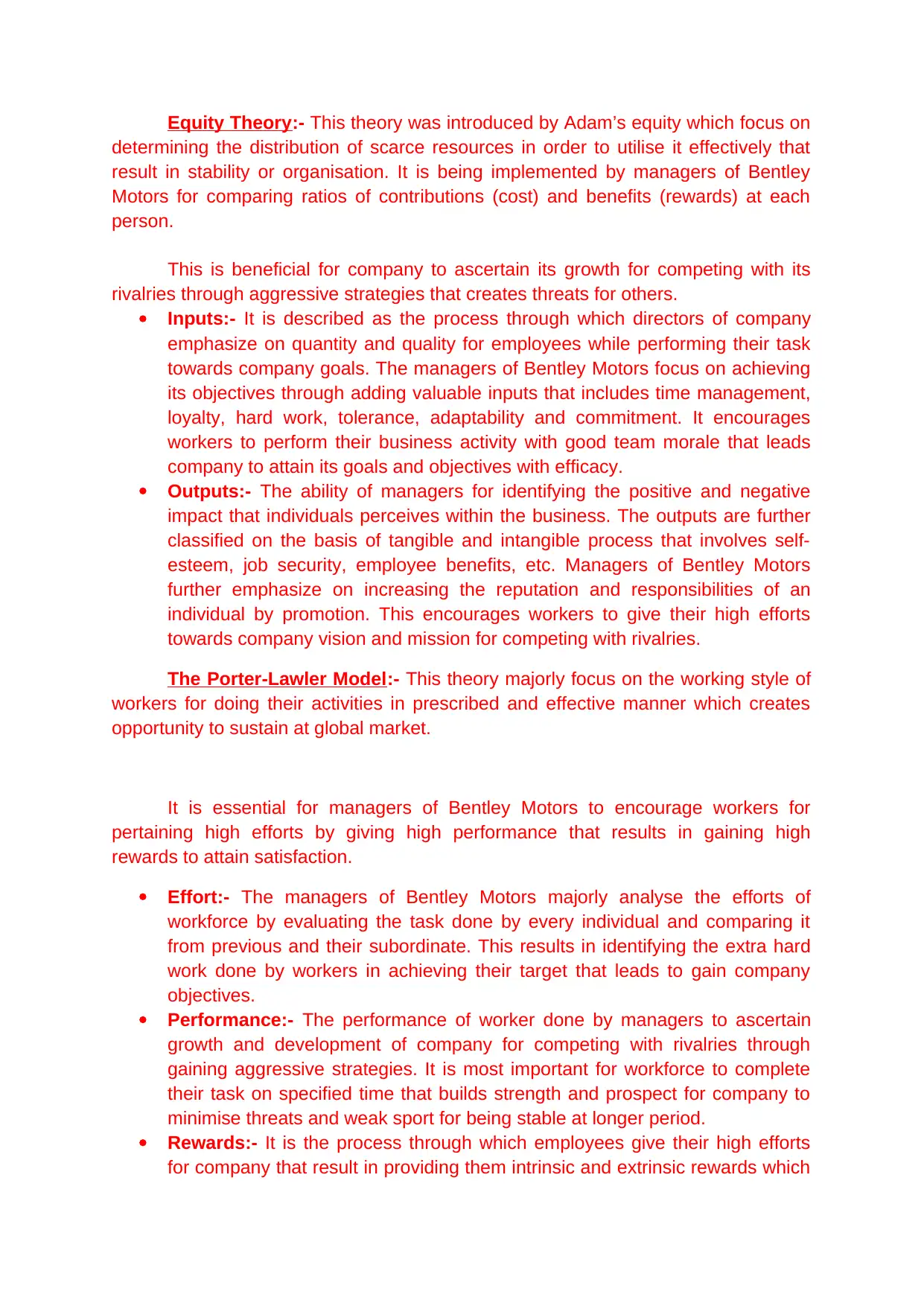
Equity Theory:- This theory was introduced by Adam’s equity which focus on
determining the distribution of scarce resources in order to utilise it effectively that
result in stability or organisation. It is being implemented by managers of Bentley
Motors for comparing ratios of contributions (cost) and benefits (rewards) at each
person.
This is beneficial for company to ascertain its growth for competing with its
rivalries through aggressive strategies that creates threats for others.
Inputs:- It is described as the process through which directors of company
emphasize on quantity and quality for employees while performing their task
towards company goals. The managers of Bentley Motors focus on achieving
its objectives through adding valuable inputs that includes time management,
loyalty, hard work, tolerance, adaptability and commitment. It encourages
workers to perform their business activity with good team morale that leads
company to attain its goals and objectives with efficacy.
Outputs:- The ability of managers for identifying the positive and negative
impact that individuals perceives within the business. The outputs are further
classified on the basis of tangible and intangible process that involves self-
esteem, job security, employee benefits, etc. Managers of Bentley Motors
further emphasize on increasing the reputation and responsibilities of an
individual by promotion. This encourages workers to give their high efforts
towards company vision and mission for competing with rivalries.
The Porter-Lawler Model:- This theory majorly focus on the working style of
workers for doing their activities in prescribed and effective manner which creates
opportunity to sustain at global market.
It is essential for managers of Bentley Motors to encourage workers for
pertaining high efforts by giving high performance that results in gaining high
rewards to attain satisfaction.
Effort:- The managers of Bentley Motors majorly analyse the efforts of
workforce by evaluating the task done by every individual and comparing it
from previous and their subordinate. This results in identifying the extra hard
work done by workers in achieving their target that leads to gain company
objectives.
Performance:- The performance of worker done by managers to ascertain
growth and development of company for competing with rivalries through
gaining aggressive strategies. It is most important for workforce to complete
their task on specified time that builds strength and prospect for company to
minimise threats and weak sport for being stable at longer period.
Rewards:- It is the process through which employees give their high efforts
for company that result in providing them intrinsic and extrinsic rewards which
determining the distribution of scarce resources in order to utilise it effectively that
result in stability or organisation. It is being implemented by managers of Bentley
Motors for comparing ratios of contributions (cost) and benefits (rewards) at each
person.
This is beneficial for company to ascertain its growth for competing with its
rivalries through aggressive strategies that creates threats for others.
Inputs:- It is described as the process through which directors of company
emphasize on quantity and quality for employees while performing their task
towards company goals. The managers of Bentley Motors focus on achieving
its objectives through adding valuable inputs that includes time management,
loyalty, hard work, tolerance, adaptability and commitment. It encourages
workers to perform their business activity with good team morale that leads
company to attain its goals and objectives with efficacy.
Outputs:- The ability of managers for identifying the positive and negative
impact that individuals perceives within the business. The outputs are further
classified on the basis of tangible and intangible process that involves self-
esteem, job security, employee benefits, etc. Managers of Bentley Motors
further emphasize on increasing the reputation and responsibilities of an
individual by promotion. This encourages workers to give their high efforts
towards company vision and mission for competing with rivalries.
The Porter-Lawler Model:- This theory majorly focus on the working style of
workers for doing their activities in prescribed and effective manner which creates
opportunity to sustain at global market.
It is essential for managers of Bentley Motors to encourage workers for
pertaining high efforts by giving high performance that results in gaining high
rewards to attain satisfaction.
Effort:- The managers of Bentley Motors majorly analyse the efforts of
workforce by evaluating the task done by every individual and comparing it
from previous and their subordinate. This results in identifying the extra hard
work done by workers in achieving their target that leads to gain company
objectives.
Performance:- The performance of worker done by managers to ascertain
growth and development of company for competing with rivalries through
gaining aggressive strategies. It is most important for workforce to complete
their task on specified time that builds strength and prospect for company to
minimise threats and weak sport for being stable at longer period.
Rewards:- It is the process through which employees give their high efforts
for company that result in providing them intrinsic and extrinsic rewards which
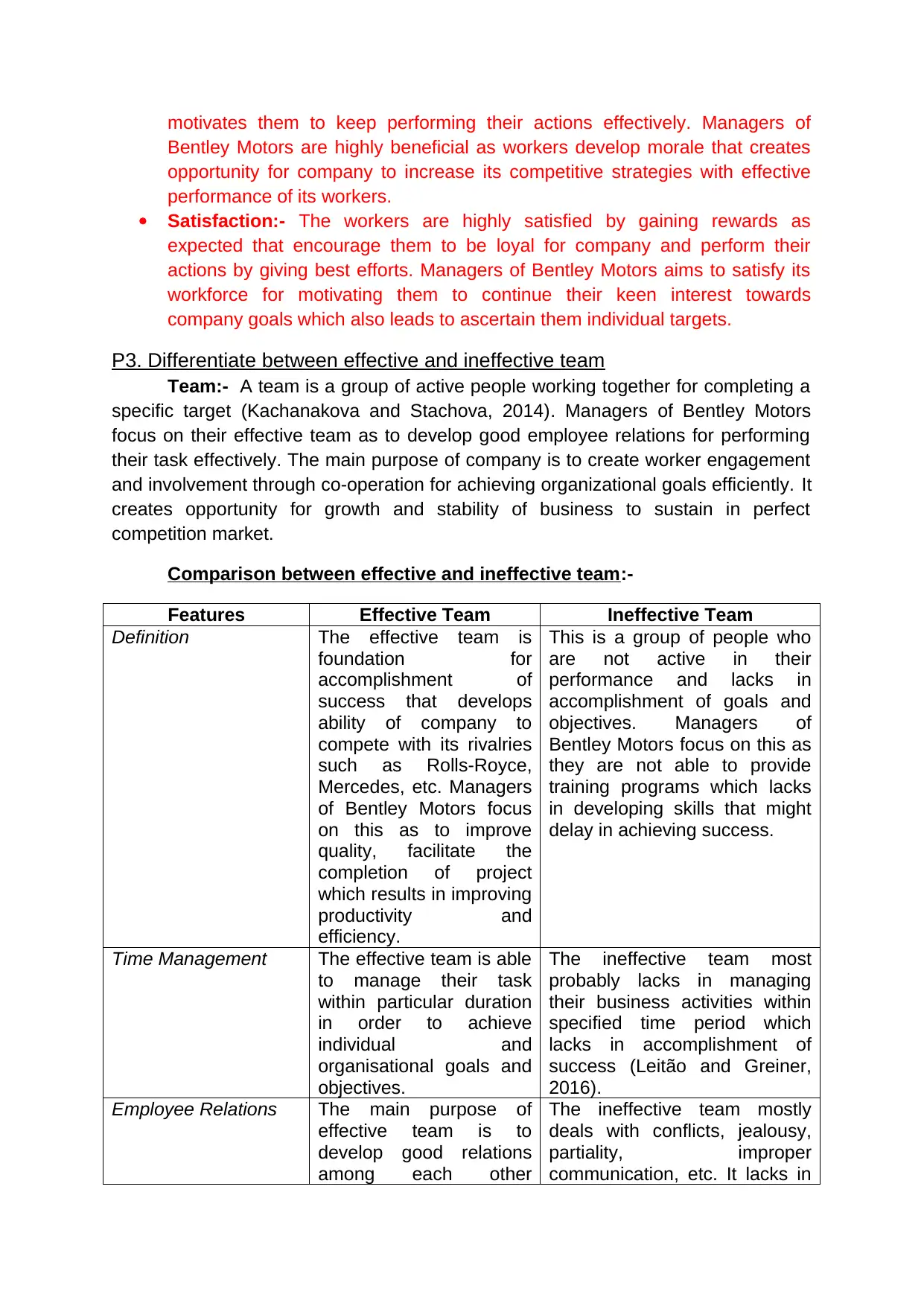
motivates them to keep performing their actions effectively. Managers of
Bentley Motors are highly beneficial as workers develop morale that creates
opportunity for company to increase its competitive strategies with effective
performance of its workers.
Satisfaction:- The workers are highly satisfied by gaining rewards as
expected that encourage them to be loyal for company and perform their
actions by giving best efforts. Managers of Bentley Motors aims to satisfy its
workforce for motivating them to continue their keen interest towards
company goals which also leads to ascertain them individual targets.
P3. Differentiate between effective and ineffective team
Team:- A team is a group of active people working together for completing a
specific target (Kachanakova and Stachova, 2014). Managers of Bentley Motors
focus on their effective team as to develop good employee relations for performing
their task effectively. The main purpose of company is to create worker engagement
and involvement through co-operation for achieving organizational goals efficiently. It
creates opportunity for growth and stability of business to sustain in perfect
competition market.
Comparison between effective and ineffective team:-
Features Effective Team Ineffective Team
Definition The effective team is
foundation for
accomplishment of
success that develops
ability of company to
compete with its rivalries
such as Rolls-Royce,
Mercedes, etc. Managers
of Bentley Motors focus
on this as to improve
quality, facilitate the
completion of project
which results in improving
productivity and
efficiency.
This is a group of people who
are not active in their
performance and lacks in
accomplishment of goals and
objectives. Managers of
Bentley Motors focus on this as
they are not able to provide
training programs which lacks
in developing skills that might
delay in achieving success.
Time Management The effective team is able
to manage their task
within particular duration
in order to achieve
individual and
organisational goals and
objectives.
The ineffective team most
probably lacks in managing
their business activities within
specified time period which
lacks in accomplishment of
success (Leitão and Greiner,
2016).
Employee Relations The main purpose of
effective team is to
develop good relations
among each other
The ineffective team mostly
deals with conflicts, jealousy,
partiality, improper
communication, etc. It lacks in
Bentley Motors are highly beneficial as workers develop morale that creates
opportunity for company to increase its competitive strategies with effective
performance of its workers.
Satisfaction:- The workers are highly satisfied by gaining rewards as
expected that encourage them to be loyal for company and perform their
actions by giving best efforts. Managers of Bentley Motors aims to satisfy its
workforce for motivating them to continue their keen interest towards
company goals which also leads to ascertain them individual targets.
P3. Differentiate between effective and ineffective team
Team:- A team is a group of active people working together for completing a
specific target (Kachanakova and Stachova, 2014). Managers of Bentley Motors
focus on their effective team as to develop good employee relations for performing
their task effectively. The main purpose of company is to create worker engagement
and involvement through co-operation for achieving organizational goals efficiently. It
creates opportunity for growth and stability of business to sustain in perfect
competition market.
Comparison between effective and ineffective team:-
Features Effective Team Ineffective Team
Definition The effective team is
foundation for
accomplishment of
success that develops
ability of company to
compete with its rivalries
such as Rolls-Royce,
Mercedes, etc. Managers
of Bentley Motors focus
on this as to improve
quality, facilitate the
completion of project
which results in improving
productivity and
efficiency.
This is a group of people who
are not active in their
performance and lacks in
accomplishment of goals and
objectives. Managers of
Bentley Motors focus on this as
they are not able to provide
training programs which lacks
in developing skills that might
delay in achieving success.
Time Management The effective team is able
to manage their task
within particular duration
in order to achieve
individual and
organisational goals and
objectives.
The ineffective team most
probably lacks in managing
their business activities within
specified time period which
lacks in accomplishment of
success (Leitão and Greiner,
2016).
Employee Relations The main purpose of
effective team is to
develop good relations
among each other
The ineffective team mostly
deals with conflicts, jealousy,
partiality, improper
communication, etc. It lacks in

through co-ordination
with engagement and
involvement for
performing their activities
to achieve specific target.
developing good relations as
the workforce are not capable
in sharing their views and
information.
Roles and Behaviours The effective team
perform its role in proper
direction and guidance of
managers and leaders
and complete their task
with respecting each
other through their beliefs
and values.
The ineffective team perform its
role not in proper direction of
managers which lacks in
management of activities and
does not respect each other.
Functions The five functions of
effective team are trust,
conflict management,
commitment,
accountability and
focusing on their results.
The functions of ineffective
team are conflict-ridden, filled
with distrust, unfaith, unfocused
on target, reeking of negative
competition.
Team Development:- This is defined as developing a team or group with
active members who are capable in perform their activities effectively for achieving
organisational goals (Margret and Hoque, 2016). Managers of Bentley Motors focus
on this as to develop trust and faith among each other by reducing conflicts. It is
essential for business as to encourage workers through proper communication and
leads in performance appraisal.
Tuckman Model:- This theory focus on the way through which an effective
team tackles or manage a task from its initial formation to the completion of project
target.
Managers of Bentley Motors implement this as it describes that team grows
with creation of individual groups through cohesive and task-focused teams.
with engagement and
involvement for
performing their activities
to achieve specific target.
developing good relations as
the workforce are not capable
in sharing their views and
information.
Roles and Behaviours The effective team
perform its role in proper
direction and guidance of
managers and leaders
and complete their task
with respecting each
other through their beliefs
and values.
The ineffective team perform its
role not in proper direction of
managers which lacks in
management of activities and
does not respect each other.
Functions The five functions of
effective team are trust,
conflict management,
commitment,
accountability and
focusing on their results.
The functions of ineffective
team are conflict-ridden, filled
with distrust, unfaith, unfocused
on target, reeking of negative
competition.
Team Development:- This is defined as developing a team or group with
active members who are capable in perform their activities effectively for achieving
organisational goals (Margret and Hoque, 2016). Managers of Bentley Motors focus
on this as to develop trust and faith among each other by reducing conflicts. It is
essential for business as to encourage workers through proper communication and
leads in performance appraisal.
Tuckman Model:- This theory focus on the way through which an effective
team tackles or manage a task from its initial formation to the completion of project
target.
Managers of Bentley Motors implement this as it describes that team grows
with creation of individual groups through cohesive and task-focused teams.
Paraphrase This Document
Need a fresh take? Get an instant paraphrase of this document with our AI Paraphraser
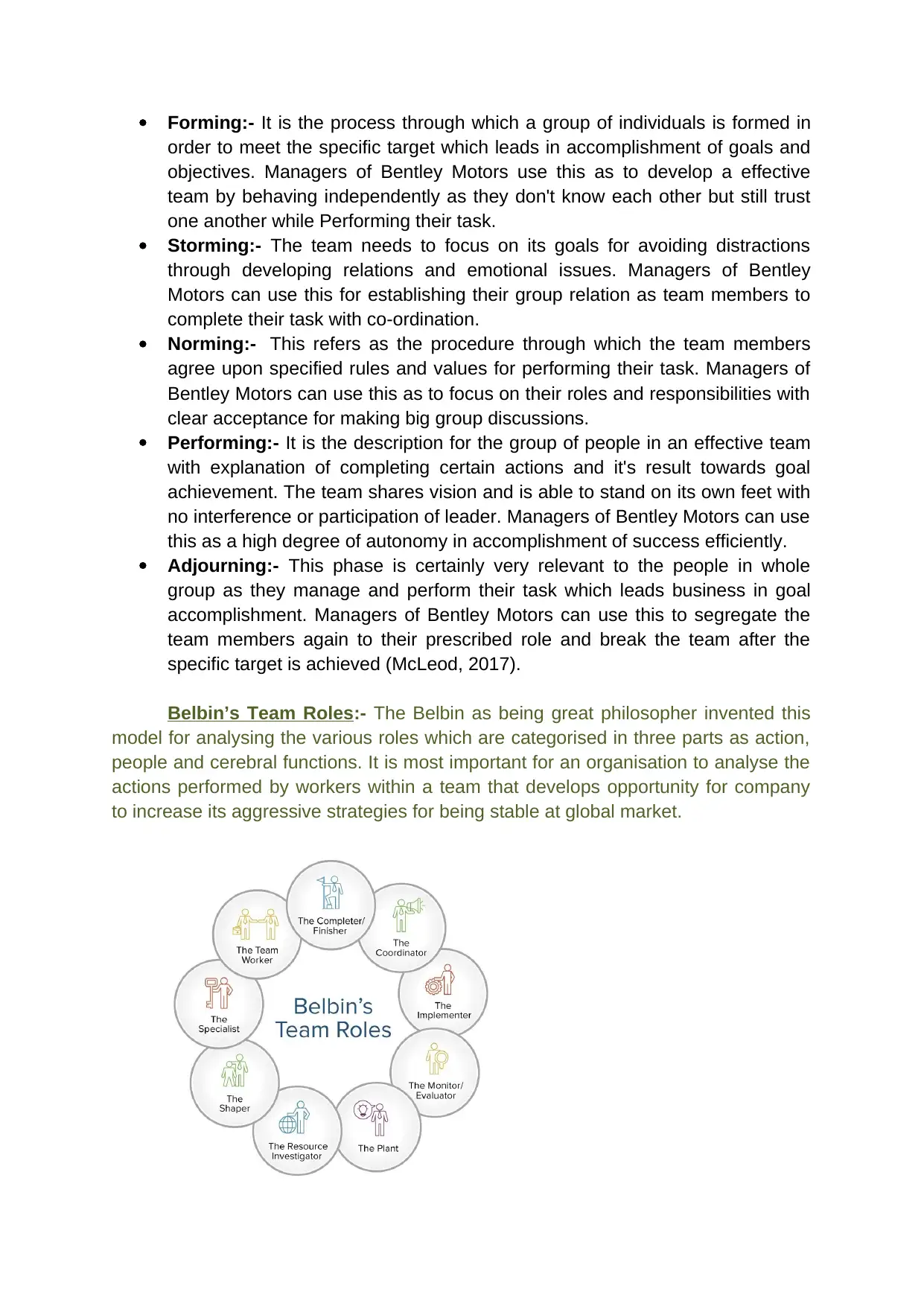
Forming:- It is the process through which a group of individuals is formed in
order to meet the specific target which leads in accomplishment of goals and
objectives. Managers of Bentley Motors use this as to develop a effective
team by behaving independently as they don't know each other but still trust
one another while Performing their task.
Storming:- The team needs to focus on its goals for avoiding distractions
through developing relations and emotional issues. Managers of Bentley
Motors can use this for establishing their group relation as team members to
complete their task with co-ordination.
Norming:- This refers as the procedure through which the team members
agree upon specified rules and values for performing their task. Managers of
Bentley Motors can use this as to focus on their roles and responsibilities with
clear acceptance for making big group discussions.
Performing:- It is the description for the group of people in an effective team
with explanation of completing certain actions and it's result towards goal
achievement. The team shares vision and is able to stand on its own feet with
no interference or participation of leader. Managers of Bentley Motors can use
this as a high degree of autonomy in accomplishment of success efficiently.
Adjourning:- This phase is certainly very relevant to the people in whole
group as they manage and perform their task which leads business in goal
accomplishment. Managers of Bentley Motors can use this to segregate the
team members again to their prescribed role and break the team after the
specific target is achieved (McLeod, 2017).
Belbin’s Team Roles:- The Belbin as being great philosopher invented this
model for analysing the various roles which are categorised in three parts as action,
people and cerebral functions. It is most important for an organisation to analyse the
actions performed by workers within a team that develops opportunity for company
to increase its aggressive strategies for being stable at global market.
order to meet the specific target which leads in accomplishment of goals and
objectives. Managers of Bentley Motors use this as to develop a effective
team by behaving independently as they don't know each other but still trust
one another while Performing their task.
Storming:- The team needs to focus on its goals for avoiding distractions
through developing relations and emotional issues. Managers of Bentley
Motors can use this for establishing their group relation as team members to
complete their task with co-ordination.
Norming:- This refers as the procedure through which the team members
agree upon specified rules and values for performing their task. Managers of
Bentley Motors can use this as to focus on their roles and responsibilities with
clear acceptance for making big group discussions.
Performing:- It is the description for the group of people in an effective team
with explanation of completing certain actions and it's result towards goal
achievement. The team shares vision and is able to stand on its own feet with
no interference or participation of leader. Managers of Bentley Motors can use
this as a high degree of autonomy in accomplishment of success efficiently.
Adjourning:- This phase is certainly very relevant to the people in whole
group as they manage and perform their task which leads business in goal
accomplishment. Managers of Bentley Motors can use this to segregate the
team members again to their prescribed role and break the team after the
specific target is achieved (McLeod, 2017).
Belbin’s Team Roles:- The Belbin as being great philosopher invented this
model for analysing the various roles which are categorised in three parts as action,
people and cerebral functions. It is most important for an organisation to analyse the
actions performed by workers within a team that develops opportunity for company
to increase its aggressive strategies for being stable at global market.
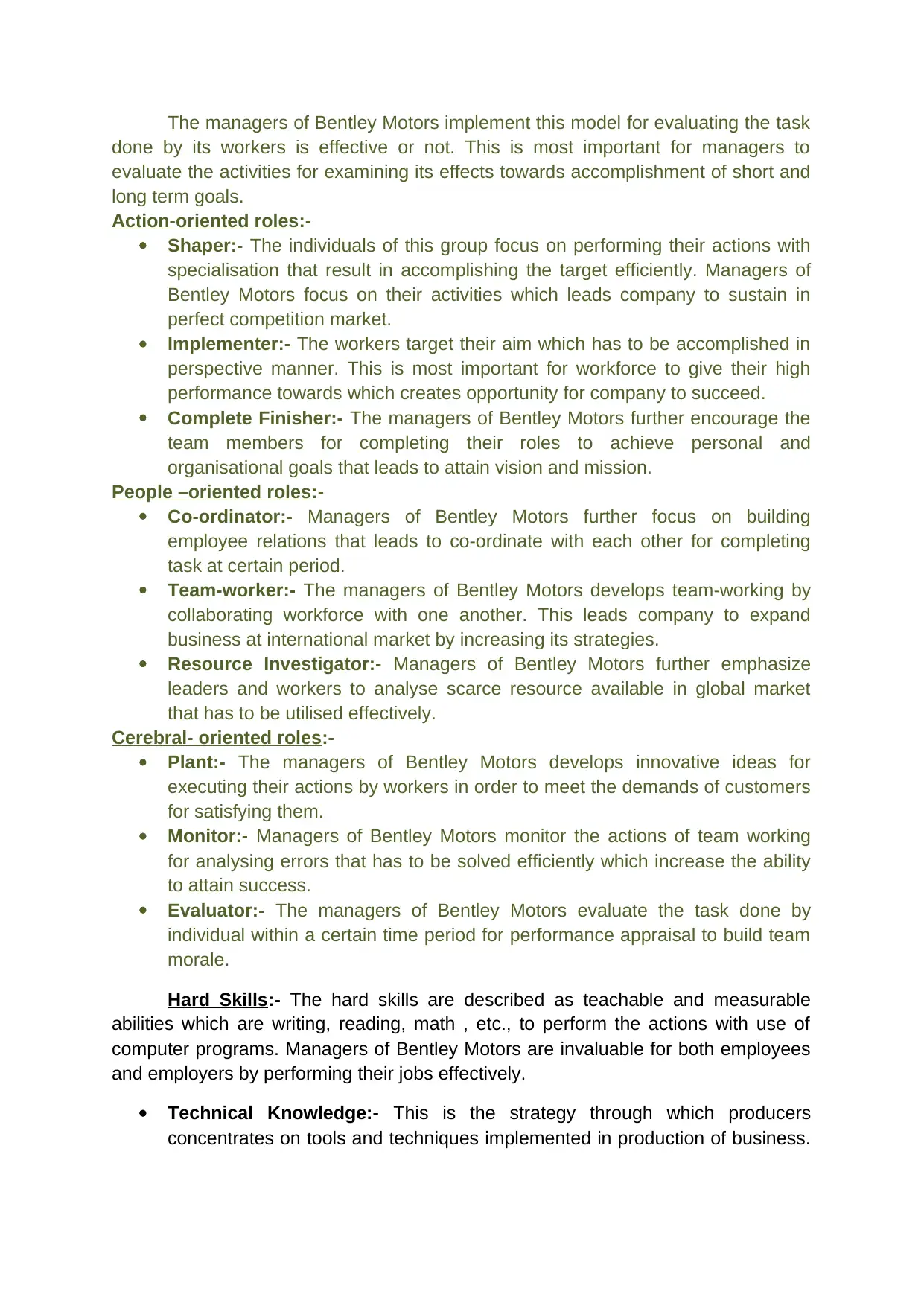
The managers of Bentley Motors implement this model for evaluating the task
done by its workers is effective or not. This is most important for managers to
evaluate the activities for examining its effects towards accomplishment of short and
long term goals.
Action-oriented roles:-
Shaper:- The individuals of this group focus on performing their actions with
specialisation that result in accomplishing the target efficiently. Managers of
Bentley Motors focus on their activities which leads company to sustain in
perfect competition market.
Implementer:- The workers target their aim which has to be accomplished in
perspective manner. This is most important for workforce to give their high
performance towards which creates opportunity for company to succeed.
Complete Finisher:- The managers of Bentley Motors further encourage the
team members for completing their roles to achieve personal and
organisational goals that leads to attain vision and mission.
People –oriented roles:-
Co-ordinator:- Managers of Bentley Motors further focus on building
employee relations that leads to co-ordinate with each other for completing
task at certain period.
Team-worker:- The managers of Bentley Motors develops team-working by
collaborating workforce with one another. This leads company to expand
business at international market by increasing its strategies.
Resource Investigator:- Managers of Bentley Motors further emphasize
leaders and workers to analyse scarce resource available in global market
that has to be utilised effectively.
Cerebral- oriented roles:-
Plant:- The managers of Bentley Motors develops innovative ideas for
executing their actions by workers in order to meet the demands of customers
for satisfying them.
Monitor:- Managers of Bentley Motors monitor the actions of team working
for analysing errors that has to be solved efficiently which increase the ability
to attain success.
Evaluator:- The managers of Bentley Motors evaluate the task done by
individual within a certain time period for performance appraisal to build team
morale.
Hard Skills:- The hard skills are described as teachable and measurable
abilities which are writing, reading, math , etc., to perform the actions with use of
computer programs. Managers of Bentley Motors are invaluable for both employees
and employers by performing their jobs effectively.
Technical Knowledge:- This is the strategy through which producers
concentrates on tools and techniques implemented in production of business.
done by its workers is effective or not. This is most important for managers to
evaluate the activities for examining its effects towards accomplishment of short and
long term goals.
Action-oriented roles:-
Shaper:- The individuals of this group focus on performing their actions with
specialisation that result in accomplishing the target efficiently. Managers of
Bentley Motors focus on their activities which leads company to sustain in
perfect competition market.
Implementer:- The workers target their aim which has to be accomplished in
perspective manner. This is most important for workforce to give their high
performance towards which creates opportunity for company to succeed.
Complete Finisher:- The managers of Bentley Motors further encourage the
team members for completing their roles to achieve personal and
organisational goals that leads to attain vision and mission.
People –oriented roles:-
Co-ordinator:- Managers of Bentley Motors further focus on building
employee relations that leads to co-ordinate with each other for completing
task at certain period.
Team-worker:- The managers of Bentley Motors develops team-working by
collaborating workforce with one another. This leads company to expand
business at international market by increasing its strategies.
Resource Investigator:- Managers of Bentley Motors further emphasize
leaders and workers to analyse scarce resource available in global market
that has to be utilised effectively.
Cerebral- oriented roles:-
Plant:- The managers of Bentley Motors develops innovative ideas for
executing their actions by workers in order to meet the demands of customers
for satisfying them.
Monitor:- Managers of Bentley Motors monitor the actions of team working
for analysing errors that has to be solved efficiently which increase the ability
to attain success.
Evaluator:- The managers of Bentley Motors evaluate the task done by
individual within a certain time period for performance appraisal to build team
morale.
Hard Skills:- The hard skills are described as teachable and measurable
abilities which are writing, reading, math , etc., to perform the actions with use of
computer programs. Managers of Bentley Motors are invaluable for both employees
and employers by performing their jobs effectively.
Technical Knowledge:- This is the strategy through which producers
concentrates on tools and techniques implemented in production of business.
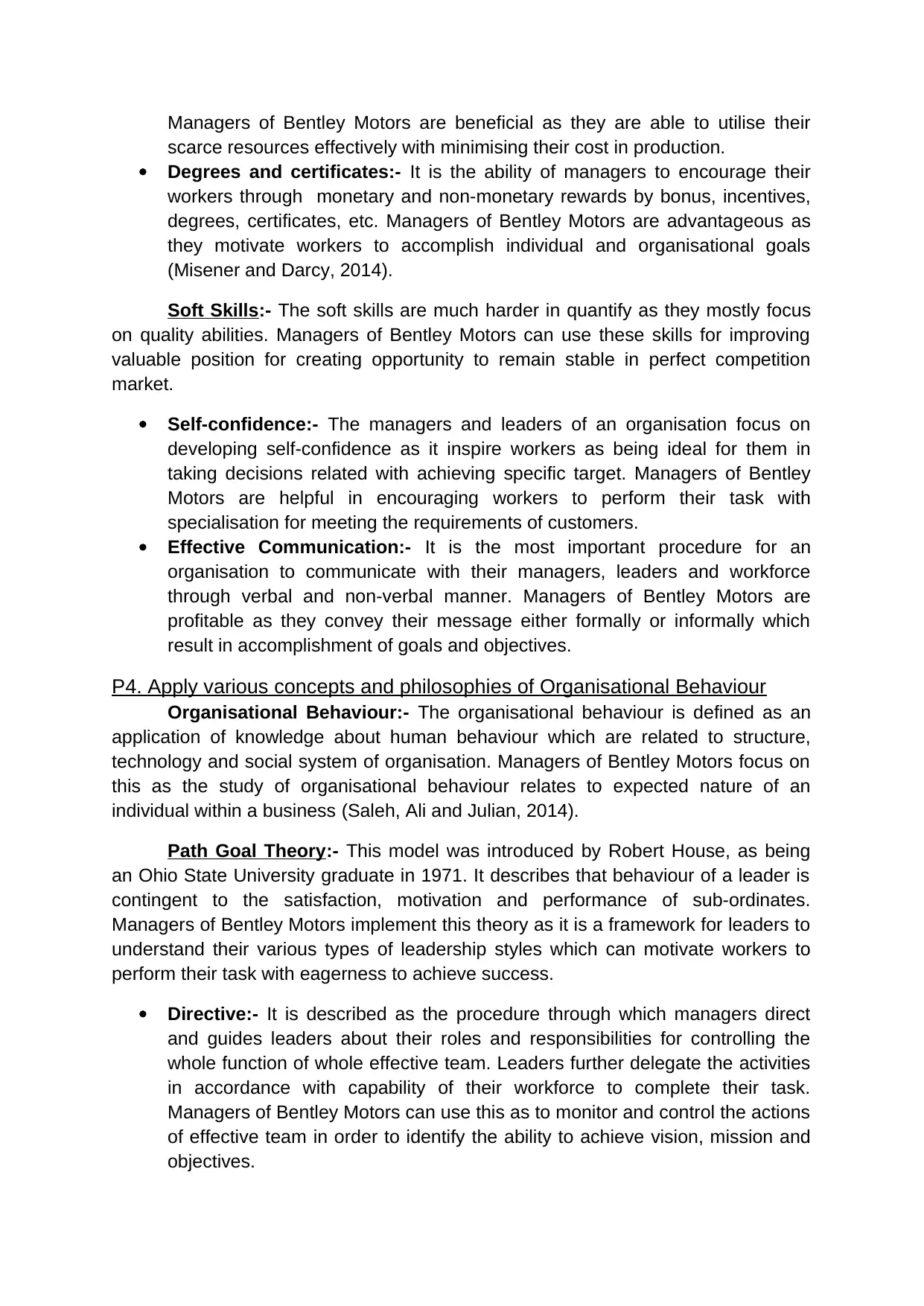
Managers of Bentley Motors are beneficial as they are able to utilise their
scarce resources effectively with minimising their cost in production.
Degrees and certificates:- It is the ability of managers to encourage their
workers through monetary and non-monetary rewards by bonus, incentives,
degrees, certificates, etc. Managers of Bentley Motors are advantageous as
they motivate workers to accomplish individual and organisational goals
(Misener and Darcy, 2014).
Soft Skills:- The soft skills are much harder in quantify as they mostly focus
on quality abilities. Managers of Bentley Motors can use these skills for improving
valuable position for creating opportunity to remain stable in perfect competition
market.
Self-confidence:- The managers and leaders of an organisation focus on
developing self-confidence as it inspire workers as being ideal for them in
taking decisions related with achieving specific target. Managers of Bentley
Motors are helpful in encouraging workers to perform their task with
specialisation for meeting the requirements of customers.
Effective Communication:- It is the most important procedure for an
organisation to communicate with their managers, leaders and workforce
through verbal and non-verbal manner. Managers of Bentley Motors are
profitable as they convey their message either formally or informally which
result in accomplishment of goals and objectives.
P4. Apply various concepts and philosophies of Organisational Behaviour
Organisational Behaviour:- The organisational behaviour is defined as an
application of knowledge about human behaviour which are related to structure,
technology and social system of organisation. Managers of Bentley Motors focus on
this as the study of organisational behaviour relates to expected nature of an
individual within a business (Saleh, Ali and Julian, 2014).
Path Goal Theory:- This model was introduced by Robert House, as being
an Ohio State University graduate in 1971. It describes that behaviour of a leader is
contingent to the satisfaction, motivation and performance of sub-ordinates.
Managers of Bentley Motors implement this theory as it is a framework for leaders to
understand their various types of leadership styles which can motivate workers to
perform their task with eagerness to achieve success.
Directive:- It is described as the procedure through which managers direct
and guides leaders about their roles and responsibilities for controlling the
whole function of whole effective team. Leaders further delegate the activities
in accordance with capability of their workforce to complete their task.
Managers of Bentley Motors can use this as to monitor and control the actions
of effective team in order to identify the ability to achieve vision, mission and
objectives.
scarce resources effectively with minimising their cost in production.
Degrees and certificates:- It is the ability of managers to encourage their
workers through monetary and non-monetary rewards by bonus, incentives,
degrees, certificates, etc. Managers of Bentley Motors are advantageous as
they motivate workers to accomplish individual and organisational goals
(Misener and Darcy, 2014).
Soft Skills:- The soft skills are much harder in quantify as they mostly focus
on quality abilities. Managers of Bentley Motors can use these skills for improving
valuable position for creating opportunity to remain stable in perfect competition
market.
Self-confidence:- The managers and leaders of an organisation focus on
developing self-confidence as it inspire workers as being ideal for them in
taking decisions related with achieving specific target. Managers of Bentley
Motors are helpful in encouraging workers to perform their task with
specialisation for meeting the requirements of customers.
Effective Communication:- It is the most important procedure for an
organisation to communicate with their managers, leaders and workforce
through verbal and non-verbal manner. Managers of Bentley Motors are
profitable as they convey their message either formally or informally which
result in accomplishment of goals and objectives.
P4. Apply various concepts and philosophies of Organisational Behaviour
Organisational Behaviour:- The organisational behaviour is defined as an
application of knowledge about human behaviour which are related to structure,
technology and social system of organisation. Managers of Bentley Motors focus on
this as the study of organisational behaviour relates to expected nature of an
individual within a business (Saleh, Ali and Julian, 2014).
Path Goal Theory:- This model was introduced by Robert House, as being
an Ohio State University graduate in 1971. It describes that behaviour of a leader is
contingent to the satisfaction, motivation and performance of sub-ordinates.
Managers of Bentley Motors implement this theory as it is a framework for leaders to
understand their various types of leadership styles which can motivate workers to
perform their task with eagerness to achieve success.
Directive:- It is described as the procedure through which managers direct
and guides leaders about their roles and responsibilities for controlling the
whole function of whole effective team. Leaders further delegate the activities
in accordance with capability of their workforce to complete their task.
Managers of Bentley Motors can use this as to monitor and control the actions
of effective team in order to identify the ability to achieve vision, mission and
objectives.
Secure Best Marks with AI Grader
Need help grading? Try our AI Grader for instant feedback on your assignments.
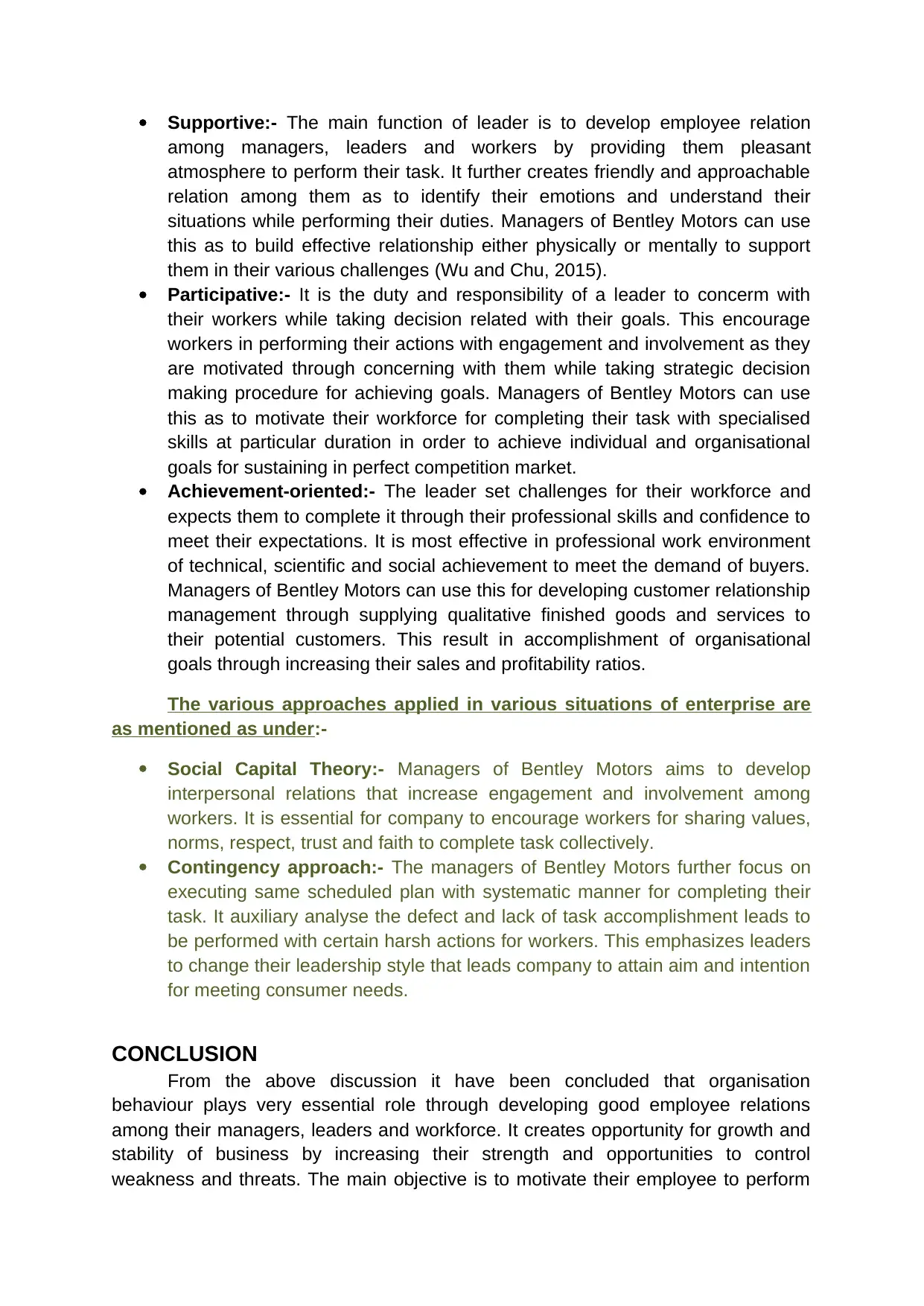
Supportive:- The main function of leader is to develop employee relation
among managers, leaders and workers by providing them pleasant
atmosphere to perform their task. It further creates friendly and approachable
relation among them as to identify their emotions and understand their
situations while performing their duties. Managers of Bentley Motors can use
this as to build effective relationship either physically or mentally to support
them in their various challenges (Wu and Chu, 2015).
Participative:- It is the duty and responsibility of a leader to concerm with
their workers while taking decision related with their goals. This encourage
workers in performing their actions with engagement and involvement as they
are motivated through concerning with them while taking strategic decision
making procedure for achieving goals. Managers of Bentley Motors can use
this as to motivate their workforce for completing their task with specialised
skills at particular duration in order to achieve individual and organisational
goals for sustaining in perfect competition market.
Achievement-oriented:- The leader set challenges for their workforce and
expects them to complete it through their professional skills and confidence to
meet their expectations. It is most effective in professional work environment
of technical, scientific and social achievement to meet the demand of buyers.
Managers of Bentley Motors can use this for developing customer relationship
management through supplying qualitative finished goods and services to
their potential customers. This result in accomplishment of organisational
goals through increasing their sales and profitability ratios.
The various approaches applied in various situations of enterprise are
as mentioned as under:-
Social Capital Theory:- Managers of Bentley Motors aims to develop
interpersonal relations that increase engagement and involvement among
workers. It is essential for company to encourage workers for sharing values,
norms, respect, trust and faith to complete task collectively.
Contingency approach:- The managers of Bentley Motors further focus on
executing same scheduled plan with systematic manner for completing their
task. It auxiliary analyse the defect and lack of task accomplishment leads to
be performed with certain harsh actions for workers. This emphasizes leaders
to change their leadership style that leads company to attain aim and intention
for meeting consumer needs.
CONCLUSION
From the above discussion it have been concluded that organisation
behaviour plays very essential role through developing good employee relations
among their managers, leaders and workforce. It creates opportunity for growth and
stability of business by increasing their strength and opportunities to control
weakness and threats. The main objective is to motivate their employee to perform
among managers, leaders and workers by providing them pleasant
atmosphere to perform their task. It further creates friendly and approachable
relation among them as to identify their emotions and understand their
situations while performing their duties. Managers of Bentley Motors can use
this as to build effective relationship either physically or mentally to support
them in their various challenges (Wu and Chu, 2015).
Participative:- It is the duty and responsibility of a leader to concerm with
their workers while taking decision related with their goals. This encourage
workers in performing their actions with engagement and involvement as they
are motivated through concerning with them while taking strategic decision
making procedure for achieving goals. Managers of Bentley Motors can use
this as to motivate their workforce for completing their task with specialised
skills at particular duration in order to achieve individual and organisational
goals for sustaining in perfect competition market.
Achievement-oriented:- The leader set challenges for their workforce and
expects them to complete it through their professional skills and confidence to
meet their expectations. It is most effective in professional work environment
of technical, scientific and social achievement to meet the demand of buyers.
Managers of Bentley Motors can use this for developing customer relationship
management through supplying qualitative finished goods and services to
their potential customers. This result in accomplishment of organisational
goals through increasing their sales and profitability ratios.
The various approaches applied in various situations of enterprise are
as mentioned as under:-
Social Capital Theory:- Managers of Bentley Motors aims to develop
interpersonal relations that increase engagement and involvement among
workers. It is essential for company to encourage workers for sharing values,
norms, respect, trust and faith to complete task collectively.
Contingency approach:- The managers of Bentley Motors further focus on
executing same scheduled plan with systematic manner for completing their
task. It auxiliary analyse the defect and lack of task accomplishment leads to
be performed with certain harsh actions for workers. This emphasizes leaders
to change their leadership style that leads company to attain aim and intention
for meeting consumer needs.
CONCLUSION
From the above discussion it have been concluded that organisation
behaviour plays very essential role through developing good employee relations
among their managers, leaders and workforce. It creates opportunity for growth and
stability of business by increasing their strength and opportunities to control
weakness and threats. The main objective is to motivate their employee to perform
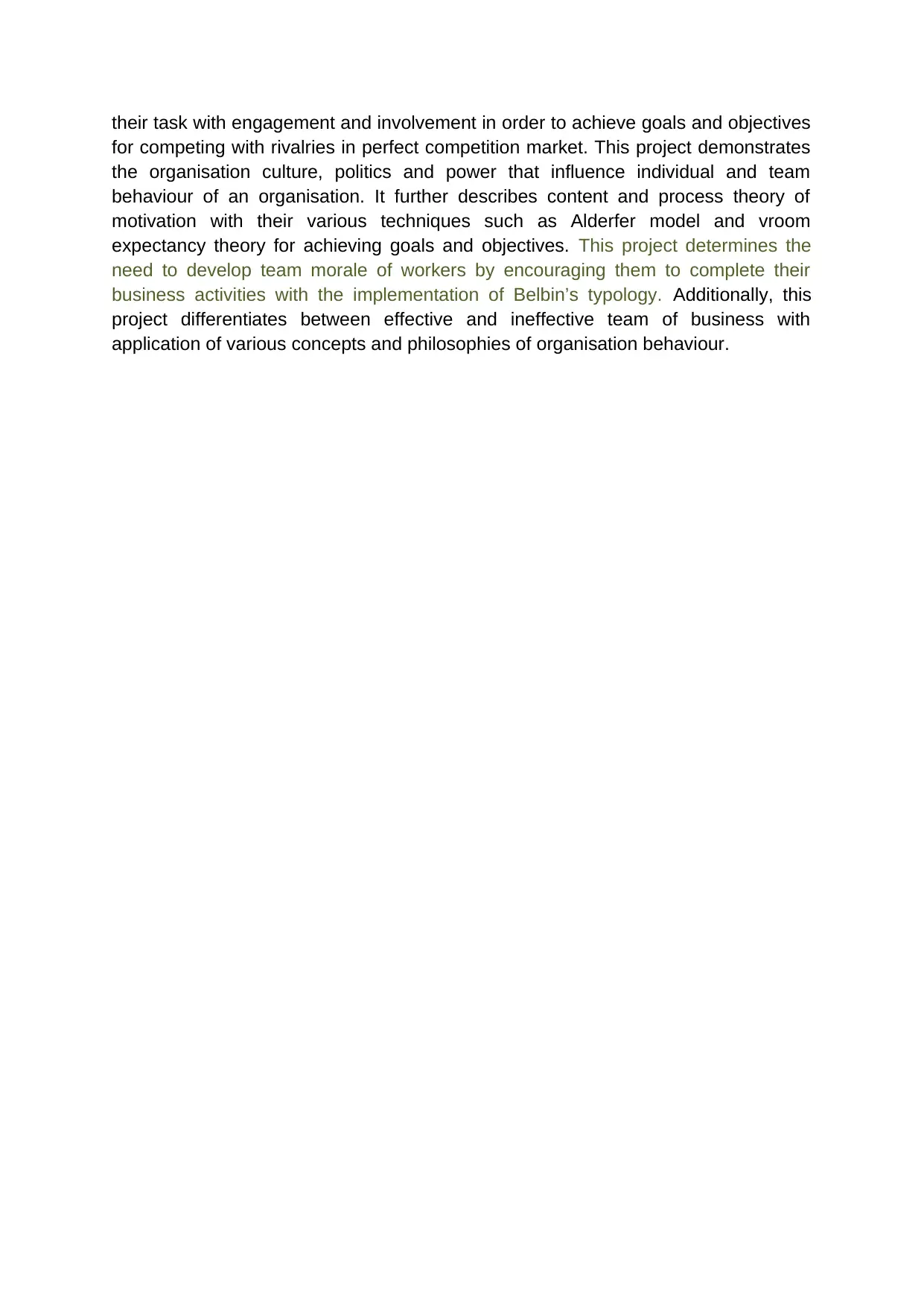
their task with engagement and involvement in order to achieve goals and objectives
for competing with rivalries in perfect competition market. This project demonstrates
the organisation culture, politics and power that influence individual and team
behaviour of an organisation. It further describes content and process theory of
motivation with their various techniques such as Alderfer model and vroom
expectancy theory for achieving goals and objectives. This project determines the
need to develop team morale of workers by encouraging them to complete their
business activities with the implementation of Belbin’s typology. Additionally, this
project differentiates between effective and ineffective team of business with
application of various concepts and philosophies of organisation behaviour.
for competing with rivalries in perfect competition market. This project demonstrates
the organisation culture, politics and power that influence individual and team
behaviour of an organisation. It further describes content and process theory of
motivation with their various techniques such as Alderfer model and vroom
expectancy theory for achieving goals and objectives. This project determines the
need to develop team morale of workers by encouraging them to complete their
business activities with the implementation of Belbin’s typology. Additionally, this
project differentiates between effective and ineffective team of business with
application of various concepts and philosophies of organisation behaviour.
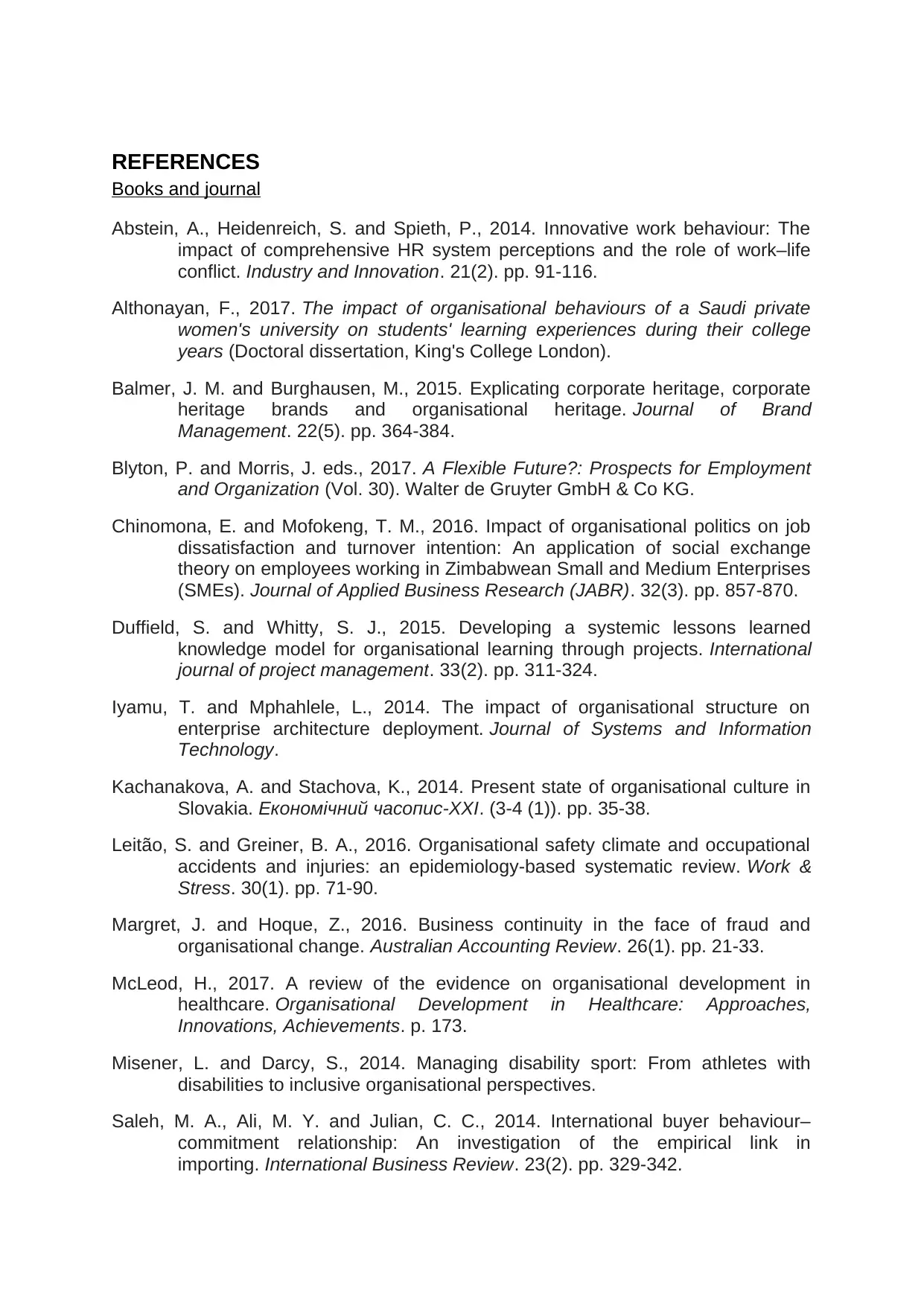
REFERENCES
Books and journal
Abstein, A., Heidenreich, S. and Spieth, P., 2014. Innovative work behaviour: The
impact of comprehensive HR system perceptions and the role of work–life
conflict. Industry and Innovation. 21(2). pp. 91-116.
Althonayan, F., 2017. The impact of organisational behaviours of a Saudi private
women's university on students' learning experiences during their college
years (Doctoral dissertation, King's College London).
Balmer, J. M. and Burghausen, M., 2015. Explicating corporate heritage, corporate
heritage brands and organisational heritage. Journal of Brand
Management. 22(5). pp. 364-384.
Blyton, P. and Morris, J. eds., 2017. A Flexible Future?: Prospects for Employment
and Organization (Vol. 30). Walter de Gruyter GmbH & Co KG.
Chinomona, E. and Mofokeng, T. M., 2016. Impact of organisational politics on job
dissatisfaction and turnover intention: An application of social exchange
theory on employees working in Zimbabwean Small and Medium Enterprises
(SMEs). Journal of Applied Business Research (JABR). 32(3). pp. 857-870.
Duffield, S. and Whitty, S. J., 2015. Developing a systemic lessons learned
knowledge model for organisational learning through projects. International
journal of project management. 33(2). pp. 311-324.
Iyamu, T. and Mphahlele, L., 2014. The impact of organisational structure on
enterprise architecture deployment. Journal of Systems and Information
Technology.
Kachanakova, A. and Stachova, K., 2014. Present state of organisational culture in
Slovakia. Економічний часопис-ХХІ. (3-4 (1)). pp. 35-38.
Leitão, S. and Greiner, B. A., 2016. Organisational safety climate and occupational
accidents and injuries: an epidemiology-based systematic review. Work &
Stress. 30(1). pp. 71-90.
Margret, J. and Hoque, Z., 2016. Business continuity in the face of fraud and
organisational change. Australian Accounting Review. 26(1). pp. 21-33.
McLeod, H., 2017. A review of the evidence on organisational development in
healthcare. Organisational Development in Healthcare: Approaches,
Innovations, Achievements. p. 173.
Misener, L. and Darcy, S., 2014. Managing disability sport: From athletes with
disabilities to inclusive organisational perspectives.
Saleh, M. A., Ali, M. Y. and Julian, C. C., 2014. International buyer behaviour–
commitment relationship: An investigation of the empirical link in
importing. International Business Review. 23(2). pp. 329-342.
Books and journal
Abstein, A., Heidenreich, S. and Spieth, P., 2014. Innovative work behaviour: The
impact of comprehensive HR system perceptions and the role of work–life
conflict. Industry and Innovation. 21(2). pp. 91-116.
Althonayan, F., 2017. The impact of organisational behaviours of a Saudi private
women's university on students' learning experiences during their college
years (Doctoral dissertation, King's College London).
Balmer, J. M. and Burghausen, M., 2015. Explicating corporate heritage, corporate
heritage brands and organisational heritage. Journal of Brand
Management. 22(5). pp. 364-384.
Blyton, P. and Morris, J. eds., 2017. A Flexible Future?: Prospects for Employment
and Organization (Vol. 30). Walter de Gruyter GmbH & Co KG.
Chinomona, E. and Mofokeng, T. M., 2016. Impact of organisational politics on job
dissatisfaction and turnover intention: An application of social exchange
theory on employees working in Zimbabwean Small and Medium Enterprises
(SMEs). Journal of Applied Business Research (JABR). 32(3). pp. 857-870.
Duffield, S. and Whitty, S. J., 2015. Developing a systemic lessons learned
knowledge model for organisational learning through projects. International
journal of project management. 33(2). pp. 311-324.
Iyamu, T. and Mphahlele, L., 2014. The impact of organisational structure on
enterprise architecture deployment. Journal of Systems and Information
Technology.
Kachanakova, A. and Stachova, K., 2014. Present state of organisational culture in
Slovakia. Економічний часопис-ХХІ. (3-4 (1)). pp. 35-38.
Leitão, S. and Greiner, B. A., 2016. Organisational safety climate and occupational
accidents and injuries: an epidemiology-based systematic review. Work &
Stress. 30(1). pp. 71-90.
Margret, J. and Hoque, Z., 2016. Business continuity in the face of fraud and
organisational change. Australian Accounting Review. 26(1). pp. 21-33.
McLeod, H., 2017. A review of the evidence on organisational development in
healthcare. Organisational Development in Healthcare: Approaches,
Innovations, Achievements. p. 173.
Misener, L. and Darcy, S., 2014. Managing disability sport: From athletes with
disabilities to inclusive organisational perspectives.
Saleh, M. A., Ali, M. Y. and Julian, C. C., 2014. International buyer behaviour–
commitment relationship: An investigation of the empirical link in
importing. International Business Review. 23(2). pp. 329-342.
Paraphrase This Document
Need a fresh take? Get an instant paraphrase of this document with our AI Paraphraser
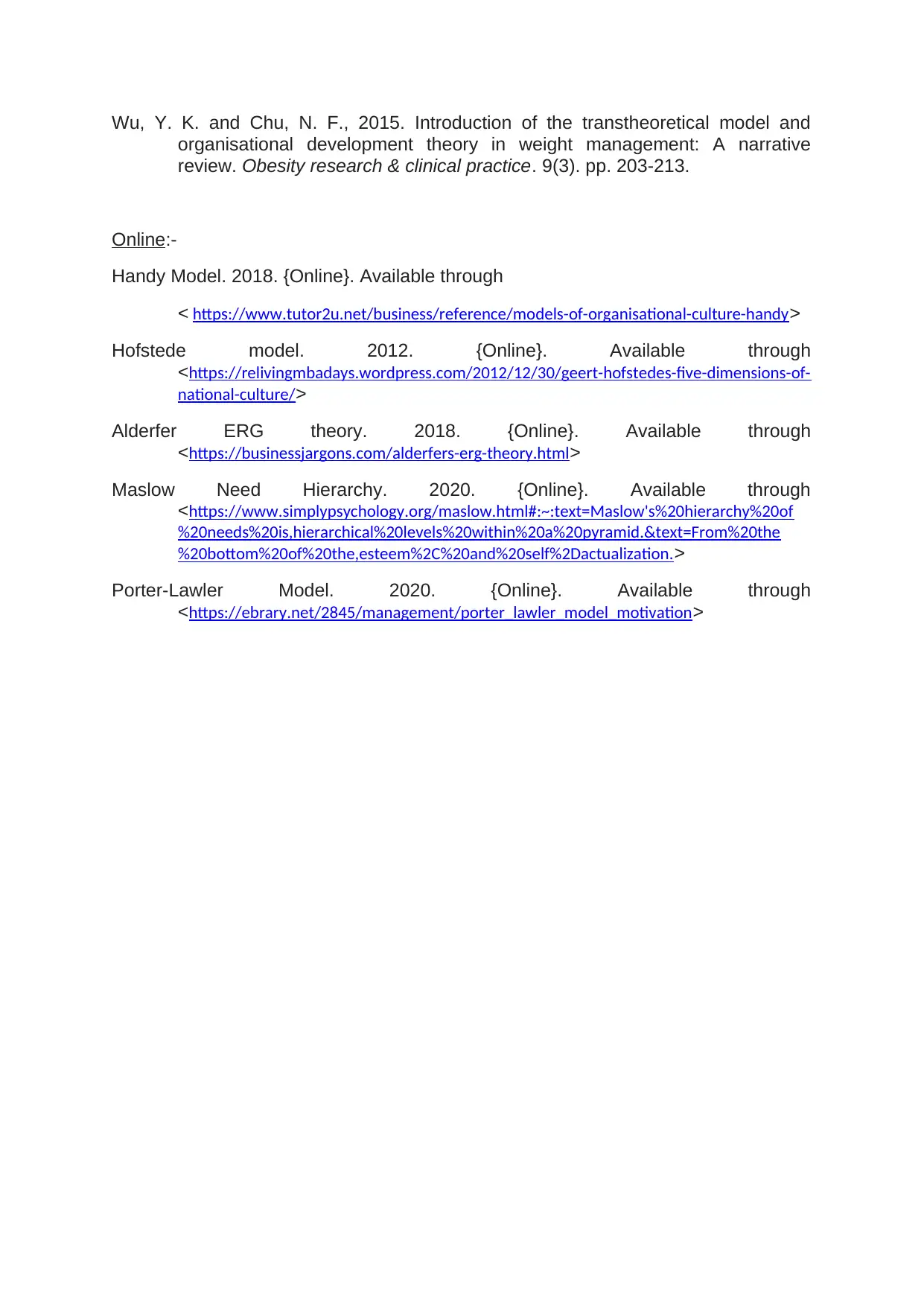
Wu, Y. K. and Chu, N. F., 2015. Introduction of the transtheoretical model and
organisational development theory in weight management: A narrative
review. Obesity research & clinical practice. 9(3). pp. 203-213.
Online:-
Handy Model. 2018. {Online}. Available through
< https://www.tutor2u.net/business/reference/models-of-organisational-culture-handy>
Hofstede model. 2012. {Online}. Available through
<https://relivingmbadays.wordpress.com/2012/12/30/geert-hofstedes-five-dimensions-of-
national-culture/>
Alderfer ERG theory. 2018. {Online}. Available through
<https://businessjargons.com/alderfers-erg-theory.html>
Maslow Need Hierarchy. 2020. {Online}. Available through
<https://www.simplypsychology.org/maslow.html#:~:text=Maslow's%20hierarchy%20of
%20needs%20is,hierarchical%20levels%20within%20a%20pyramid.&text=From%20the
%20bottom%20of%20the,esteem%2C%20and%20self%2Dactualization.>
Porter-Lawler Model. 2020. {Online}. Available through
<https://ebrary.net/2845/management/porter_lawler_model_motivation>
organisational development theory in weight management: A narrative
review. Obesity research & clinical practice. 9(3). pp. 203-213.
Online:-
Handy Model. 2018. {Online}. Available through
< https://www.tutor2u.net/business/reference/models-of-organisational-culture-handy>
Hofstede model. 2012. {Online}. Available through
<https://relivingmbadays.wordpress.com/2012/12/30/geert-hofstedes-five-dimensions-of-
national-culture/>
Alderfer ERG theory. 2018. {Online}. Available through
<https://businessjargons.com/alderfers-erg-theory.html>
Maslow Need Hierarchy. 2020. {Online}. Available through
<https://www.simplypsychology.org/maslow.html#:~:text=Maslow's%20hierarchy%20of
%20needs%20is,hierarchical%20levels%20within%20a%20pyramid.&text=From%20the
%20bottom%20of%20the,esteem%2C%20and%20self%2Dactualization.>
Porter-Lawler Model. 2020. {Online}. Available through
<https://ebrary.net/2845/management/porter_lawler_model_motivation>
1 out of 20
![[object Object]](/_next/static/media/star-bottom.7253800d.svg)





